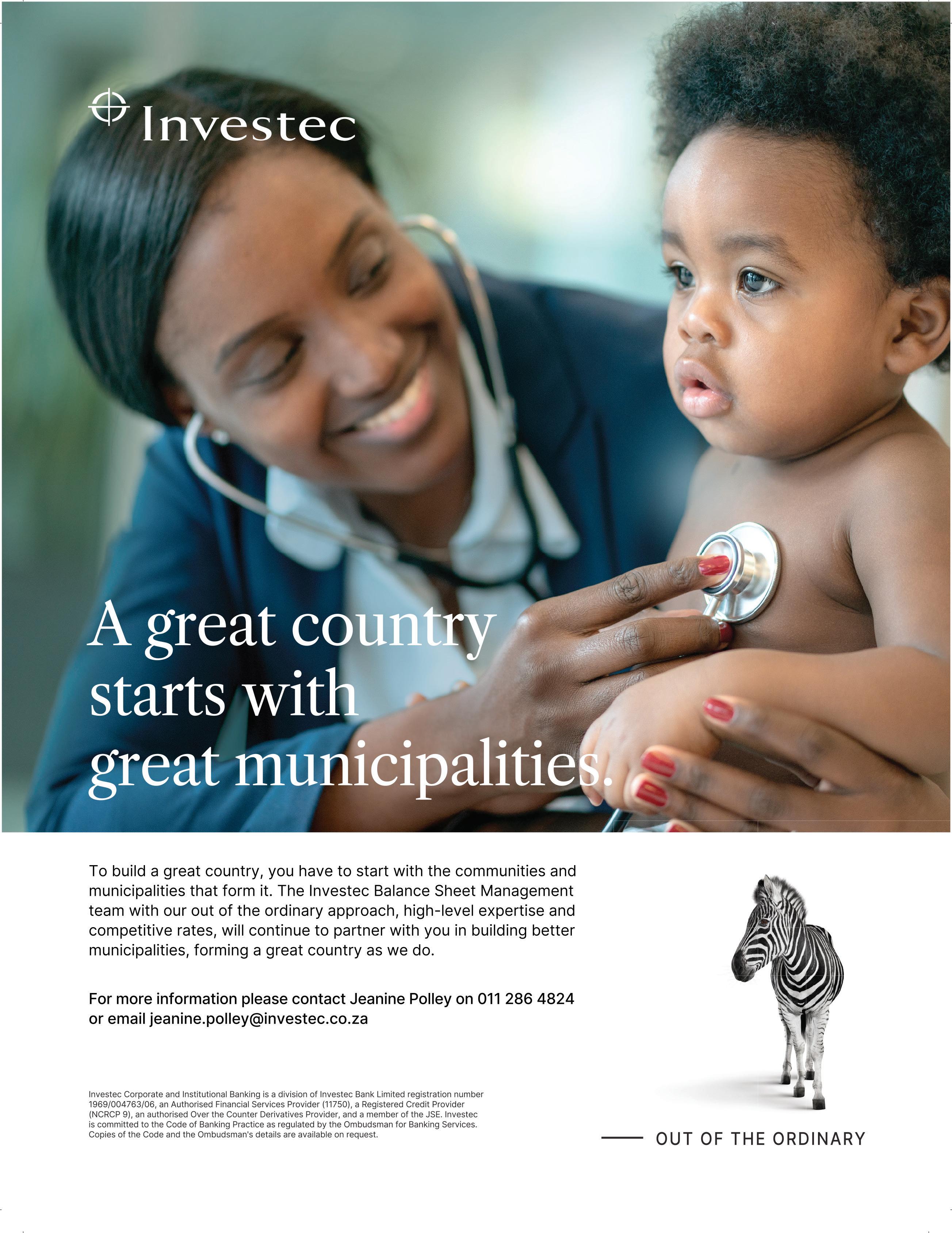


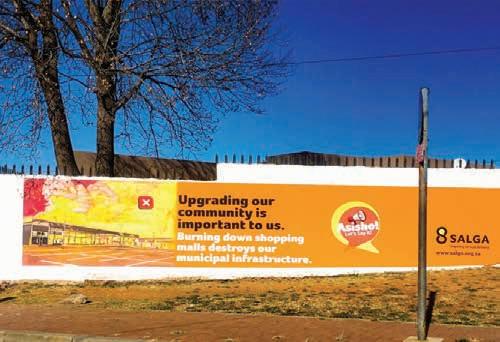
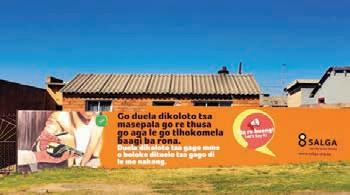
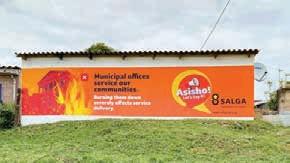
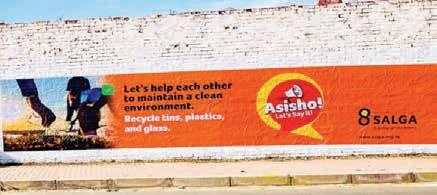
ISSUE 40 www.salga.org.za COMMITTED TO SERVICE DELIVERY INSIDE: ASISHO! LET'S SAY IT! | GENDER EQUALITY | ADOPT A MUNICIPALITY | DIGITAL INCLUSION

Gear up for renewable energy and future-proof your municipality in preparation for private power trading NERSA licensed energy trader (TRD01/ELC/09)

Contact us now Visit: www.powerx.energy or Email: info@powerx.energy Phone: 087 806 8972 POWERX extends an offer to: Align with SA’s most experienced energy trader and let us assist your municipality in its energy transition Create an enabling environment for your key economic contributors to achieve their respective sustainability targets Provide an alternative source of power to consumers Help develop a private power trading environment Assist your municipality in reducing reliance on a single power supplier Assist in implementing a billing framework to integrate with your municipal systems Attract project investment into your municipality Assist your municipality in avoiding infrastructural capacity upgrade costs Generate revenue from the use of your municipal network Help reduce costs through a potential reduction in your Notified Maximum Demand
3 EDITORIAL DELIVERY
Technological advances for e cient and speedy service delivery.
6

THE CEO
Committed to service delivery: Lance Joel, acting CEO of SALGA, shares the organisation’s continued commitment to helping municipalities deliver critical services to South Africa’s citizens.
12 A TRIBUTE
SALGA pays tribute to outgoing CEO Xolile George.
THE PULSE
PLUGGED IN
16 ASISHO! LET’S SAY IT!
SALGA has rolled out its nationwide Asisho! Let’s Say It! campaign, which is educating members of the local community about their civic obligations and responsibilities.
IN THE HEADLINES
19 SALGA WOMEN’S COMMISSION
The importance of gender equality and participation of women in local governance

20 NON-FINANCIAL CENSUS


The release of the preliminary results for the 2020 Non-Financial Census of Municipalities o ers valuable insights into the e ects of COVID-19 on service delivery, with the statistics re ecting a mixed bag of results for the country.
22 GENDER EQUALITY
Mayor Tania Campbell, executive mayor of the City of Ekurhuleni Metropolitan Municipality, weighs in on the slow pace of gender transformation within local government.
THOUGHT LEADERSHIP
24 GENDER-BASED VIOLENCE
Lindi Dlamini, CEO of the GBVF, shares the important work and impact of a community-based organisation in the fight against gender-based violence and femicide in Limpopo.
CONTENTS
ISSUE 40, INSIDE THIS ISSUE
27 DIGITAL INCLUSION
In some nancially strained municipalities, the digital function is often overlooked in favour of other key programmes.
28 NEW TECHNOLOGY FOR SERVICE DELIVERY
Elsabe Booyens, CEO of Lehaeng Technology, shares that technological advances are changing how governments can deliver their services.
31 TECHNOLOGY FOR VAT RECONCILIATIONS

FIRtech CEO Ugan Maistry explains the technology of a new VAT reconciliation bot that could help cash-strapped municipalities simplify their VAT administration and recover unclaimed revenues.
33 LOCAL GOVERNMENT MUST BE PROFESSIONALISED
Parmi Natesan, CEO of IoDSA, writes that the recent report on local government by the AGSA, is a timely reminder of the prevailing dysfunction in municipalities across the country, and the catastrophic impact it is having on all South Africans.
THE LONG VIEW
COMMUNITY INTEREST
36 GROWING MUNICIPAL REVENUE
A study of the causes of the technical and nontechnical water losses in KwaZulu-Natal municipalities and the concomitant loss of revenue.
MUNICIPAL MATTERS
40 DEVELOPMENT PLAN TO
STIMULATE THE LOCAL ECONOMY
The Chris Hani District Economic Development and Investment Summit has put the district in a prime position to drive the Eastern Cape’s economy.
41 THE PLAYGROUND FOR LOCAL TV SHOWS
The Eastern Cape is attracting global film and media attention after hosting the last two seasons of Survivor South Africa.
42 SAFETY FIRST
Stellenbosch Municipality is determined to become the safest municipality in the country by 2025.
46 ADOPT A MUNICIPALITY
SALGA Gauteng is taking troubled municipalities under its wing.

47 STRENGTHENING WATER AND SANITATION SERVICES
Municipalities will benefit from SALGA’s Water Services Collaborative Programme.
49 ILEMBE BENEFICIARIES FINALLY RECEIVE TITLE DEEDS
A pilot programme implemented by the International Finance Corporation (IFC) in collaboration with the Vuthela iLembe Local Economic Development Programme is exploring opportunities to reduce the cost burden on homeowners trying to obtain their title deeds.
THE BULLETIN
SALGA IN ACTION
50 MUNICIPAL COUNCIL SPEAKERS GATHER
As municipalities delve deeper into their long-term goals and planned projects to help their cities grow and thrive over the ve-year term of o ce for current councils, municipal council speakers countrywide gathered for the SALGA Council of Speakers.
2 VOICE OF LOCAL GOVERNMENT ISSUE 40
UPFRONT
FROM
12 24
SALGA
TECHNOLOGICAL ADVANCES TO HELP SERVICE DELIVERY
Technology has certainly become a disruptor. And now it seems that this disruptor could be the helping hand that local government needs to deliver efficient timely services to our communities. Elsabe Booyens, CEO of Lehaeng Technology, s hares, on page 28, that government can apply artificial intelligence (AI) to save up to 1.2 billion hours of work. She adds that “technological advances are changing how governments can deliver their services, from ensuring food safety to carrying out gambling inspections, issuing key documents, and more. Virtual inspections and licensure hearings are speeding up approvals and increasing the reach of individual inspectors. Similarly, AI and big data analytics have been applied to problems ranging from building code violations to financial fraud investigations, resulting in the saving of both lives and budgets”
If COVID-19 has taught us anything, it’s that technology is a key driver for the sustainability of the economy, so why not welcome a drive for government to evolve and innovate. Well, SALGA’s Kutlwano Chaba shares that, unfortunately, some financially strained municipalities must prioritise other key programmes over digital technology.
As a country, we’ve just recently celebrated women’s month, but it seems the pace for gender equality within local government is still too slow. Too few women are leading within this space, but where they are leading, we find some significant successes. Read more on pages 22–23. We’d love to find more of these pockets of excellence, so if your municipality is raising the flag for gender parity, send us your stories to share with everyone else.
For those of you who may not know, SALGA has had to bid farewell to Xolile George. We pay tribute to his leadership and share key milestones of his time spent working towards better administration with local government. He has moved on to Parliament, so is not lost to the sector completely. We wish him well in his new portfolio and welcome Lance Joel as SALGA’s acting CEO. ▪
Raina Julies
If COVID-19 has taught us anything, it is that technology is a key driver for the sustainability of the economy.
Director, Marketing & Communication: Tebogo Mosala
Communication & Marketing Officer: Marelda Boshielo
Marketing Officer: Valerie Setshedi

Content Writer: Bonolo Selebano

PICASSO EDITORIAL & PRODUCTION TEAM
Content Manager: Raina Julies, rainaj@picasso.co.za
Contributors: Elsabe Booyens, Trevor Crighton, Lindi Dlamini, Sue-Ellen Donough, Dale Hes, Lance Joel, Ugan Maistry, Itumeleng Mogaki, Parmi Natesan, Bonolo Selebano, Rodney Weidemann
Copy Editor: Brenda Bryden
Content Co-ordinator: Vanessa Payne
Head of Design: Jayne Macé-Ferguson
Senior Designer: Mfundo Archie Ndzo
Advert Designer: Bulelwa Sotashe
Cover images: Supplied
Sales Project Manager: Jerome van der Merwe, jeromem@picasso.co.za
Sales Team: Frank Simons, Jacqueline Bezuidenhout, Natasha Hendricks
Production Editor: Shamiela Brenner
Advertising Co-ordinator: Shamiela Brenner
Subscriptions and Distribution: Fatima Dramat, fatimad@picasso.co.za
Business Manager: Lodewyk van der Walt Lodewykv@picasso.co.za
Management Accountant: Deidre Musha
General Manager, Magazines: Jocelyne Bayer
012-369-8000 Fax: 012-369-8001
SALGA
Tel: 043-727-1150
043-727-1156/67
Hill on Empire, 16 Empire Road (cnr Hillside Road), Parktown, Johannesburg, 2193
Postal Address: PO Box 12500, Mill Street, Cape Town, 8010 www.businessmediamags.co.za


Printing: CTP Printers, Cape Town
Follow
up to date with SALGA news.
Copyright:

SALGA
State SALGA House 36 McGregor Street East End Bloemfontein 9300
Tel: 051-447-1960 Fax: 051-430-8250
SALGA Gauteng 3rd Floor Braampark Forum 2, 33 Hoofd Street Braamfontein 2017 Tel: 011-276-1150 Fax: 011-276-3636
SALGA KwaZulu-Natal 4th Floor Clifton Place Hurst Grove Musgrave Durban 4001
Tel: 031-817-0000 Fax: 031-817-0034
SALGA Limpopo 127 Marshall Street Polokwane 0699
Tel: 015-291-1400 Fax: 015-291-1414
SALGA Mpumalanga Salga House 11 Van Rensburg Street Nelspruit 1200 Tel: 013-752-1200 Fax: 013-752-5595
SALGA North West 56 William Street Witkoppies Klerksdorp 2571
Tel: 018-462-5290 Fax: 018-462-4662
SALGA Northern Cape Block Two, Montrio Corporate Park, 10 Oliver Road, Monument Heights, Kimberley 8301

Tel: 053-836-7900/8 Fax: 053-833-3828
SALGA Western Cape 7th Floor 44 Strand Street Cape Town 8000 Tel: 021-446-9800 Fax: 021-418-2709
Picasso Headline and SALGA. No portion of this magazine may be reproduced in any form without written consent of the publisher. The publisher is not responsible for unsolicited material. Voice of Local Government is published quarterly by Picasso Headline. The opinions expressed are not necessarily those of SALGA or Picasso Headline. All advertisements/advertorials and promotions have been paid for and therefore do not carry any endorsement by SALGA or the publisher.
and like us to keep
National Office Menlyn Corporate Park Block B 175 Corobay Avenue Cnr Garsfontein and Corobay Waterkloof Glen, Ext 11 Pretoria 0001 Tel:
Eastern Cape Berea Terrace Office Building First Floor, Suite 3 Berea East London 5214
Fax:
Free
Published by Picasso Headline, a proud division of Arena Holdings (Pty) Ltd
3ISSUE 40 VOICE OF LOCAL GOVERNMENT EDITORIAL DELIVERY UPFRONT

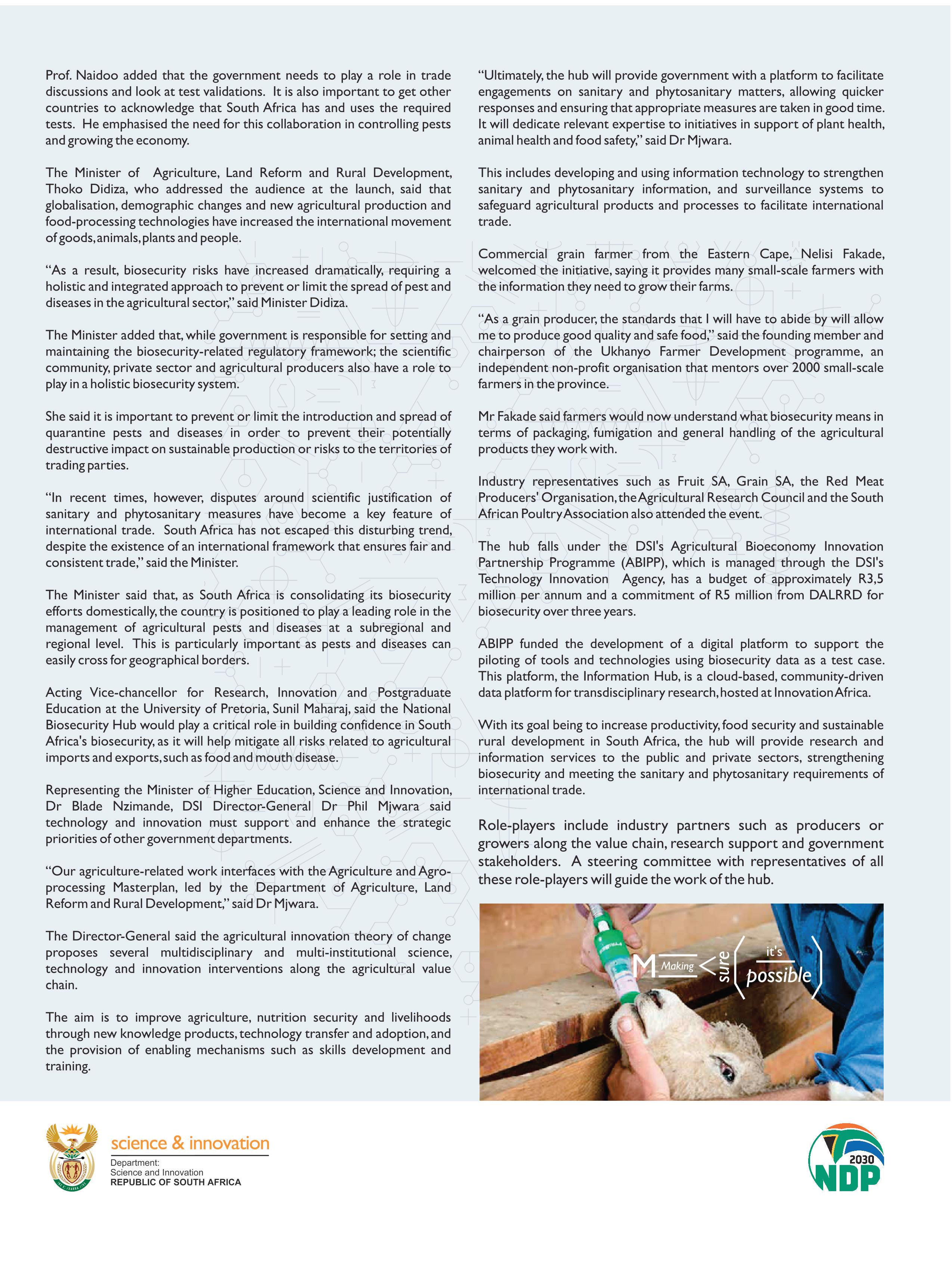
COMMITTED TO SERVICE DELIVERY
Lance Joel, acting CEO of SALGA, shares the organisation’s continued commitment to helping municipalities deliver critical services to South Africa’s citizens
As acting CEO, I would like to rea rm that SALGA’s role continues to be one focused on championing the needs of citizens and communities across South Africa while also delivering critical support to the country’s many municipalities. It is tting that we acknowledge all the hard work undertaken by the former CEO, Xolile George, and appreciate the e orts he has made on behalf of the organisation and its municipalities over the past 15 years. We wish him good fortune as he takes up his new role as Parliamentary secretary.
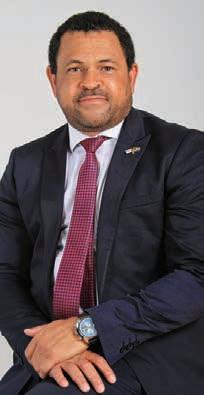
Considering that one of SALGA’s primary functions is to interface with Parliament, cabinet and provincial legislatures, his role as secretary to Parliament is well suited to his long experience in local government.
We believe that his vast experience in policy, legislation, systems and programme implementation at all levels of government over the past three decades will stand him in good stead to ll the position e ectively.
SALGA EVENTS PAST AND TO COME
As an organisation, one of SALGA‘s key focuses is on its members and the individuals that make up these member municipalities. To this end, we are pleased to announce that the 2022 edition of the SALGA Council of Speakers, (SCoS) took place in July, in accordance with article 18 of the SALGA Constitution.
This council was initially created to serve as a forum through which various municipal speakers could consult one another. SCoS
has, in recent years, discussed issues such as improving governance and service delivery within local government, or other matters of common interest.
The most recent meeting of the SCoS, held in July in the Matjhabeng Municipality, served as a consultative forum for the development of local government positions on policies and legislation impacting local government. Among the key areas unpacked during this important two-day programme were the role of speakers in enhancing good governance and sustainability, the progress made by municipalities on the post-election transition, and a focus on the dynamics of managing council business in a scenario where the municipality itself is governed by a coalition.
During this meeting, municipal speakers from across the country had the opportunity to deliberate on topical issues such as the above, and to consult one another on various matters of common interest regarding improving governance and service delivery.
We are also pleased to note that the much anticipated Division of Revenue bill has been signed into law. This new act should provide for the equitable division of revenue raised nationally among the national, provincial and local spheres of government; the determination of each province’s equitable share; and the relevant allocations to provinces, local government and municipalities from national government’s equitable share. It will also delineate the
responsibilities of all three spheres, pursuant to such division and allocations.
SALGA is committed to strengthening its role in the UCLG and affiliated structures as a key part of its current five-year strategy to position itself as a leading local government association globally.
I would like to note that with women’s month having just passed, SALGA acknowledges that women in local government still face many more challenges than their male counterparts. To address this, the recent SALGA Women’s Commission (SWC) meeting a rmed its support for the national developmental goal of women’s empowerment and gender equality at a local government level. The SWC met in Boksburg, Gauteng, to elect a new national chairperson and adopt a programme of action toward achieving gender equality and further advance the struggle for emancipation.
Lance Joel
6 VOICE OF LOCAL GOVERNMENT I SSUE 40
Held every three years, the UCLG World Summit and Congress builds on the century-old origins of the organisation as a movement driven by peace, solidarity and city diplomacy, and the pledge of the local and regional governments’ constituency around the world to safeguard the dreams and aspirations of their communities.
Aware that failing future generations is not an option, the municipal movement will gather from 10–14 October under the theme “Local and Regional
Governments Breaking Through as One”, bringing the local leadership and international actors together to meet a scenario of breakthrough.
The registration process is currently open and can be done online.
High on the agenda too is the need to address the setbacks and reversals in achieving 50/50 representation following the 2021 local government elections. The SWC must address the issue of decreasing gender representation in local government in terms of leadership representation and employment representation. But despite all these setbacks, we must also congratulate the e orts made by all the women in our public service to deliver to our people. We recognise their important role in helping to solve the many challenges our nation faces. We’d also like to extend a congratulations to Cllr. Ntandokazi Capa on her election as the new Chairperson of the SWC.
As we move into the last quarter of 2022, it is also worth highlighting some of the exciting events still to come in SALGA’s calendar, starting with the forthcoming National Meeting of Mayors.
Taking place in East London in the Eastern Cape later this year, the meeting of mayors operates similarly to the SCoS, serving as a platform for mayors from the various municipalities to share information and experiences.
The goal is to enable mayors and executive mayors to have a forum to

consult with one another about di culties or challenges their municipality face and to share ideas, advice, insight and support on matters directly a ecting their role and function.
Sharing information is the best way to improve our municipalities. The Council of Mayors will enable sharing of critical best practices by successful regions and allow those still struggling to obtain the requisite tips and solutions to achieve the same. As SALGA, we view this as a platform that will enable us to hear – straight from the horse’s mouth, so to speak – our mayors’ requirements and how SALGA can assist them with their needs.We also view this forum as an opportunity for senior members of local government to influence the national landscape regarding legislation and policy by highlighting key changes they may seek relating to local government legislation to be promulgated.
As with the Council of Mayors, our forthcoming National Municipal Managers Forum is a gathering for municipal managers to allow them to learn, share information, and consult with SALGA about legislative or policy changes they might wish to see.
Up later this year is our National Council of Provinces (NCOP) Local Government
Week – a period dedicated to bringing together both local government and the legislative sector. Led by the NCOP, it allows for attention to be focused on the challenges confronting local government and to address the critical legislative gaps that negatively impact service delivery. This is particularly apt as the theme for this week focuses on improving oversight and accountability. It is also necessary, following the Auditor-General’s report outlining the lack of consequence management and accountability in local government. As with our other forums and councils, the chief goal here is to facilitate dialogue on local government issues and foster a common understanding of the challenges at hand, as well as propose short-, medium- and long-term systemic and/or legislative solutions, while also showcasing best practices as part of knowledge sharing, and reviewing relevant legislation a ecting local government.
INTERNATIONAL CONNECTIONS AND CO-OPERATION
SALGA will continue maintaining and developing its international ties with other municipal organisations through our attendance at the United Cities and Local Governments (UCLG) Seventh World Congress.
Taking place in Daejeon, South Korea, this year’s theme is “Local and regional governments breaking through as one”. This is the single biggest event bringing together local government organisations from around the globe. Over 3 000 local government practitioners, ministers and mayors are expected to attend.

SALGA is committed to strengthening its role in the UCLG and a liated structures as a key part of its current ve-year strategy to position itself as a leading local government association globally. This responds to our mandate of pro ling South African local government regionally, continentally, and internationally. We look forward to not only participating, but also in uencing speci c outcomes and – perhaps most crucially –learning from other municipalities how they excel in certain areas. ▪
The most recent meeting of the SCoS, held in July in the Matjhabeng Municipality, served as a consultative forum for the development of local government positions on policies and legislation impacting local government.
IMAGE: SUPPLIED
THE 2022 UCLG WORLD SUMMIT AND CONGRESS CEO’S FOREWORD UPFRONT 7ISSUE 40 VOICE OF LOCAL GOVERNMENT

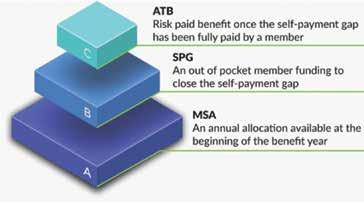
Embracing your choice for quality care. www.sizwehosmed.co.za A YEAR OF GROWTH 2021 - 2022 1stANNIVERSARY
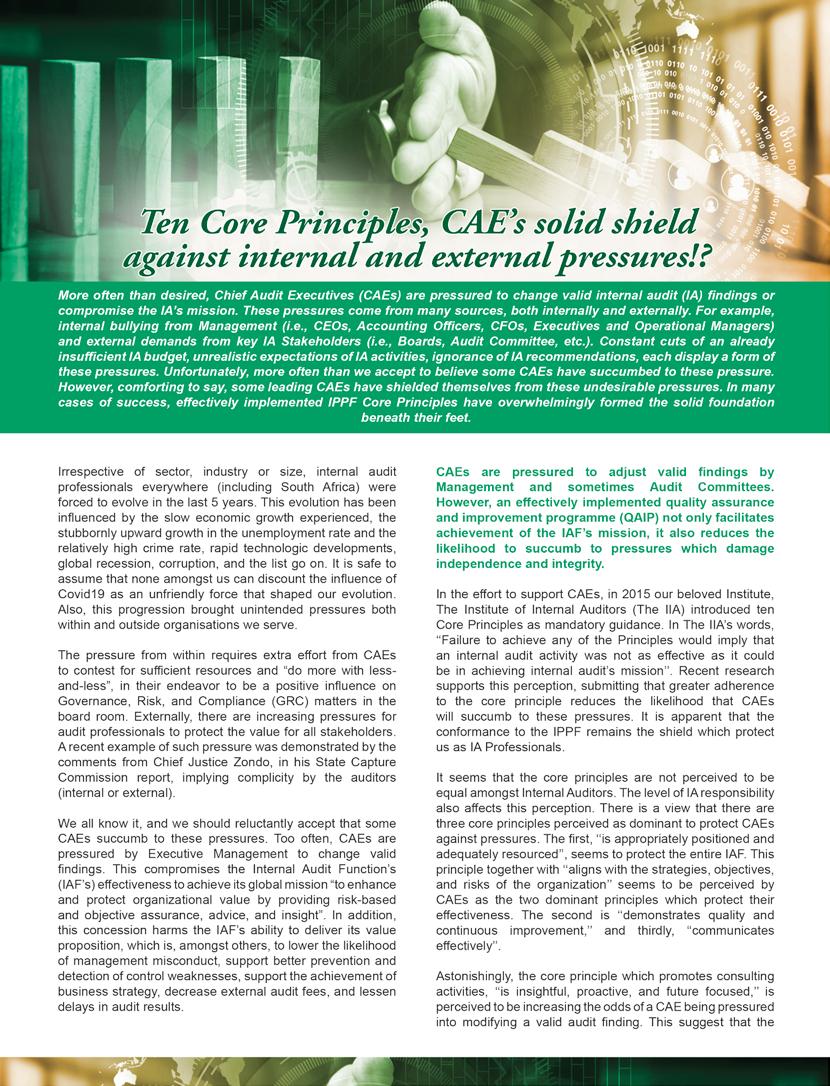
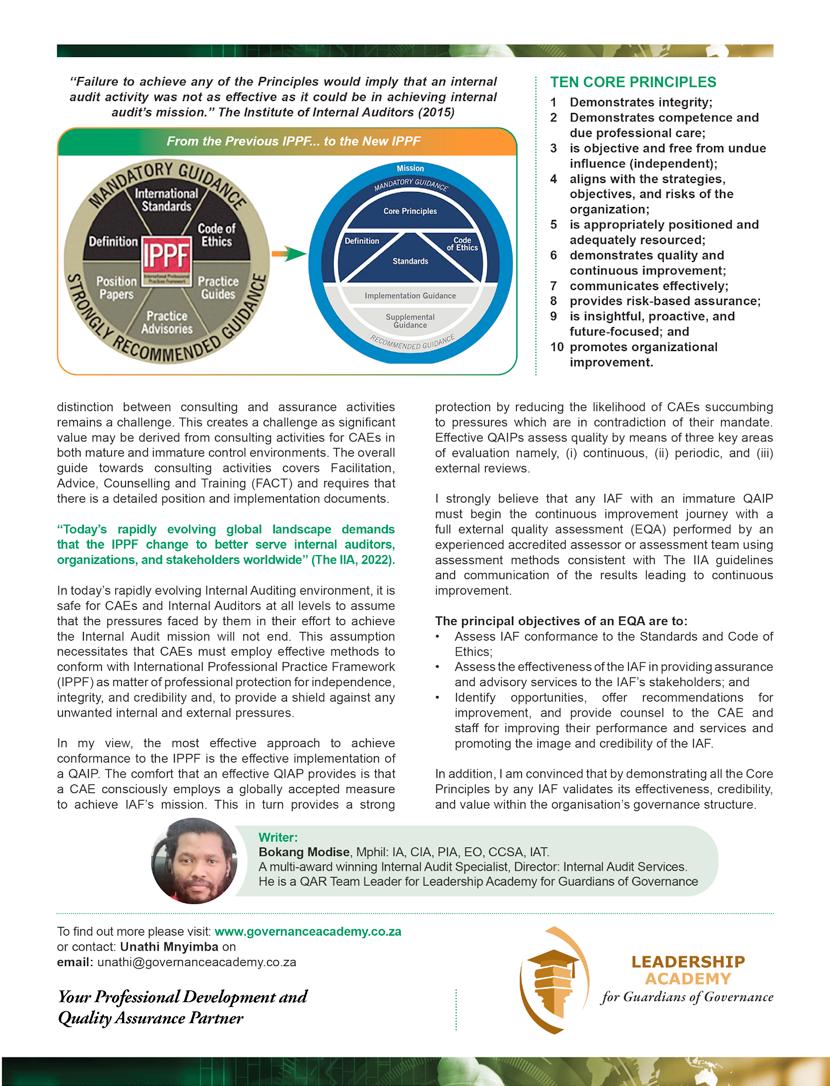
HONOURING OUR VISIONARY AND ETHICAL LEADER
SALGA pays tribute to former chief executive o cer Xolile George for his inspirational and impactful 15 years of leadership.
The South African Local Government Association (SALGA) recognises and honours the service and dedication of Xolile George. George stepped down as chief executive officer (CEO) after 15 years of remarkable leadership to take up a post in Parliament.George served as the CEO of SALGA from 2007 to 2022 and has been integral to the important advances the organisation has made over the last decade and a half. During his tenure, he put into practice his wide-ranging knowledge of the local government sector and SALGA was glad to have him at the helm for many significant achievements.
George led SALGA to the achievement of 10 clean audits in a series of 13 unquali ed audits since 2009 – a rare feat for both public and private sector organisations.
He also left the organisation on a strong financial footing from which it can facilitate future growth. As of 2022, the total value of SALGA’s assets amounts to R569.5-million. In addition, the organisation consistently achieved its strategic goals and registered an onaverage performance of 90 per cent over 13 years.
Under his leadership, SALGA concluded five multiyear conditions of service agreements with unions representing the municipal workforce. George was instrumental in creating an environment of collaboration, openness, and transparency with unions in the sector.
As SALGA’s CEO, George was responsible for providing strategic, financial, and operational leadership for the organisation in a challenging and ever-changing local government environment. SALGA has benefitted immensely from his wisdom, direction, and integrity.
By Bonolo Selebono

ACHIEVEMENTS UNDER HIS HELM










Over the years that George was at the helm of SALGA there were many signi cant achievements. The following are but some of the accomplishments during his tenure:









































































































• 5.1 per cent increase in SALGA membership levy revenue to R686-million (2021: R652.7-million).


• SALGA, in partnership with the National Council of Provinces, established the rst Local Government Week in 2012.



• Establishment of the SALGA Centre for Leadership and Governance , to develop thought leadership in the sector.

• Championed local government representation on various intergovernmental relations platforms to protect and promote its interests in policy and legislative processes.


• Introduced employee service bene ts in 2014 due to a consistent improvement in SALGA’s nancial position and increased budgets from R67-million in 2007 to approximately R800-million per annum currently.





























• SALGA developed an in uential role in municipal partnerships and the development of local governance capacity in sister associations across ve regions in Africa, which includes SALGA’s representative role in the African Union.
 Xolile George
Xolile George
12 VOICE OF LOCAL GOVERNMENT ISSUE 40
• SALGA is recognised globally across all seven continents for the establishment of municipal development partnerships that continue to benefit many cities and towns in South Africa.
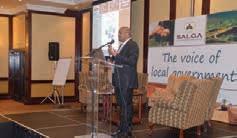
• SALGA established partnerships with international funding resources to develop local government, including the International Cooperation Agency of the Association of Netherlands Municipalities for decentralisation, Canadian Federation of Municipalities (for economic development strategies, Belgian Federation of Cities for decentralisation and governance reform, German Cities Association for development and financial management, Deutsche Gesellschaft für Internationale Zusammenarbeit GmbH for climate change infrastructure, and the Japan International Cooperation Agency Water and Sanitation Municipal Support Programme for managing the water business value chain.







• SALGA occupies positions of influence in the global families of local government, including the United Cities and Local Governments.SALGA is represented on the boards of the Commonwealth Local Government Forum, Metropolis, Local Governments for Sustainability and United Nations Advisory Committee of Local Authorities to represent local government in UN governance structures that develop and co-ordinate the implementation of the SDGs, Paris Agreement on Climate Change and the Sendai Framework on Local Disaster
Risk Reduction, as well as the Addis Ababa Agreement on Financing, which develops cities and towns.

• SALGA provided governance reform and capacity-building support to 10 sister local government associations in the Southern Africa Development Community.
• Lobbied CoGTA and National Treasury to amend the Municipal Infrastructure Grant framework for the procurement of specialised waste management vehicles, which – once approved – will improve municipal waste management services significantly.
• Lobbied the Department of Agriculture, Land Reform and Rural Development for an extension without penalty to municipalities to develop and implement a single land-use scheme that is compliant with the Spatial Planning and Land Use Management Act, 16 of 2013.
• SALGA and National Treasury intervention on municipal joint procurement has equipped municipalities to make informed joint procurement decisions to leverage economic growth. Made submissions to at least nine different bills, including the Municipal Systems Amendment Bill, the 2020 and 2021 Division of Revenue 2nd Amendment Bills and the Upgrading of Land Tenure Rights Amendment Bill.
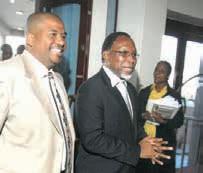
• 7 484 municipal officials and Councillors benefitted from SALGA’s continuous development and capacity building programmes.
PUBLIC LEADER
George boasts a wide array of awards that bear testament to the contributions he made to improve the local government sector. He is a recipient of various certi cates of excellence from the Auditor-General of South Africa for excellent nancial institutional performance of SALGA.
His commitment to the principles and values of public nancial management saw him being presented with the 2016–17 Excellence in Public Finance Management Award from the South African Institute of Chartered Accountants (SAICA). He is also a SADC and continental winner for the CEO Titans leadership award in the public enterprises category for 2015 and 2016 respectively.

As a result of these and other awards that recognised his strong leadership and ethics, George has become both well-known and highly regarded on the continent and abroad.
HIS LEGACY
George has left an organisation that is t for purpose, innovative, agile, resilient, and which can support its member municipalities to enhance the social and economic development of their communities.
Under his leadership, SALGA became one of the few public entities that have been able to sustain an enduring tradition of being a beacon of nancial management excellence.
Since joining SALGA, George has proven himself to be an outstanding leader with vision, purpose, and remarkable integrity.
A NEW APPOINTMENT
As SALGA’s CEO, George was responsible for providing strategic, financial, and operational leadership for the organisation in a challenging and ever-changing local government environment. SALGA has benefitted immensely from his wisdom, direction, and integrity.
George has now opened a new chapter in his career. He was appointed as Secretary to Parliament in June and has begun serving his ve-year term. He will be responsible for heading the administration of Parliament and governing its structures and strategic functions.
SALGA wishes him well in his new role. ▪
IMAGE: SUPPLIED
Xolile George addressing delegates at an event.
Xolile George and SALGANS at employee awards.
Xolile George with Kgalema Mothlanthe.
OTHER KEY ACHIEVEMENTS DURING XOLILE GEORGE’S LEADERSHIP TRIBUTE UPFRONT 13ISSUE 40 VOICE OF LOCAL GOVERNMENT




SMS SWITCH TO 33035 OR VISIT BONITAS.CO.ZA TO JOIN SMSs CHARGED AT R1.50. FREE SMSs DO NOT APPLY. Ts & Cs APPLY. CELEBRATING 40 YEARS OF PROVIDING AFFORDABLE, QUALITY HEALTHCARE TO ALL SOUTH AFRICANS. #40YEARSOFBONITAS #40YEARSOFBONITAS CELEBRATING 40 YEARS OF PROVIDING AFFORDABLE, QUALITY HEALTHCARE TO ALL SOUTH AFRICANS. 2021/2022 ASK AFRIKA ORANGE INDEX AWARD FOR SERVICE EXCELLENCE! #40yearso f b o n i t a s YEARS 40
BONITAS 2022 CONTRIBUTIONS CONTINUED FOR 2023
Bonitas Medical Fund has announced its 2023 product line-up and a prize freeze on contributions for the rst quarter of 2023, writes Lee Callakoppen, principal o cer of Bonitas.
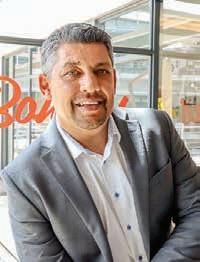
The average increase from Bonitas for 2023 would have been 5.9 per cent – well below the current inflation rate of 7.6 per cent.
However, we’ve frozen contribution increases for the rst quarter of 2023, which e ectively means an increase of 4.8 per cent over the 12 months. We have also shared what members can expect to pay from 1 April 2023.
It’s a balancing act between keeping increases as low as possible while maintaining sustainability. By applying low contribution increases since December 2020, the Scheme has effectively passed R1.4-billion in savings to members.
The Scheme is nancially stable with over R7.4-billion in reserves and has signed up over 190 000 new members in the last 36 months.
The future of healthcare is around primary and preventative care. There is a rise in non-communicable or lifestyle diseases, such as diabetes, high blood pressure and cancer, 80 per cent of which are caused by lifestyle risk factors. We o er a range of managed care programmes to help members understand and manage their conditions.
CANCER CARE
Last year, we announced our partnership with the South African Oncology Consortium to enhance our cancer programme, including screening for early detection, treatment and palliative care. For 2023, we have restructured bene ts to be unlimited for Prescribed Minimum Bene t (PMB) cancers.
DIABETES
Data from the South African Health Quality Assessment shows that Bonitas has an e ective disease management programme and better outcomes than the industry standard for diabetic members. In 2023, we introduce an annual family benefit of
R51 000 for an insulin pump or continuous glucose monitor for type 1 diabetics under 18 years of age.
MENTAL HEALTH
E ective October 2022, our Panda digital solution will support members in managing their mental wellness. The free app o ers everything from audio sessions with peers and mental health experts to one-on-one virtual consultations with professionals. Members are encouraged to complete an online mental health questionnaire to assess their mental health status.
BENEFIT BOOSTER
Launched last year, the Bene t Booster aims to support our preventative care strategy. It unlocked R446-million in additional bene ts for members to extend their day-to-day bene ts. For 2023, we are adjusting the bene t limits in line with utilisation with enhancements seen on several plans.
DESIGNATED SERVICE PROVIDERS
We implement networks to negotiate favourable tari s for our members, so they can avoid out-of-pocket expenses and get more value. This includes:
• A GP network of over 4 400 practices.
• A pharmacy network, with around 2 500 practices to dispense chronic, acute and over-the-counter medicine, through Scriptpharm.
• DENIS, our dental network, provides access to around 3 000 practices.

• An optical network of over 2 300 practices, through PPN.
MEDICINE FORMULARY
Our medicines formulary is aligned to the WHO’s Essential Medicines List to promote a ordability and accessibility to clinically approved medicines.
HOSPITAL-AT-HOME
This service brings all the essential elements of in-hospital care to a patient’s home. In 2023, we include a programme for re-admissions, screening and disease prevention, an alternative to stepdown facilities and kidney dialysis at home.
SAVINGS
We’ve amended our rules to allow members to use their savings as they deem fit for the new year and have increased savings by up to 9.4 per cent, depending on the plan selected.
EXCLUSIVE OFFERS AND DISCOUNTS
For 2023, we’ve partnered with top providers for exclusive o ers across several categories, including lifestyle, wellness, gap cover, short-term insurance, life insurance, and credit solutions.
We remain committed to providing quality healthcare at a ordable prices while ensuring the sustainability of the Scheme. ▪
Scan this QR code to go directly to the Bonitas website.

For more information:
002
ADVERTORIAL | BONITAS 15ISSUE 40 VOICE OF LOCAL GOVERNMENT IMAGES: SUPPLIED
Lee Callakoppen
0860
108 www.bonitas.co.za @BonitasMedical
ASISHO CREATES NEW PLATFORMS FOR COMMUNITY INVOLVEMENT
Recognising that communities have a crucial role to play in the e ective governance of local municipalities, SALGA has rolled out its nationwide Asisho! Let’s Say It! campaign, which is educating members of the local community about their civic obligations and responsibilities. By Dale Hes

The Asisho! Let’s say It! campaign comes on the back of mounting debt as a result of unpaid bills for municipal services. These unpaid bills are costing the economy billions of rand and hampering local government’s ability to e ectively deliver services to the people.
Asisho! will “give greater voice to residents on issues a ecting their towns, cities, and communities and motivate and inspire a new approach to citizen collaboration with local councils that aims to build public trust and make local governments more accountable and collaborative”.
The campaign focuses strongly on educating community members about their duties and obligations toward social and economic upliftment by paying for services.
“Currently, municipal consumer debt amounts to R255-billion, and households represent the largest component of this debt. The role played by members of local communities in creating a nancially viable local government system is vital and SALGA, as the uni ed voice of local government in South Africa, wants to stimulate the opening up of conversation about this,” says SALGA president Bheki Sto le.
The campaign has seen a nationwide roll out of murals, and static and digital billboards that seek to educate, inform and inspire a call to action for communities to pay for their municipal rates and service charges.
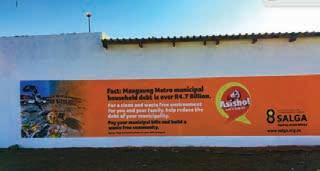
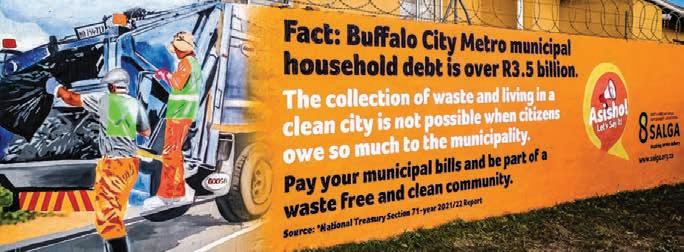
“On the one hand, municipalities have a duty to render basic municipal services, such as water, electricity, sanitation, and waste removal to communities, and on the other hand, communities have a duty to pay for those services,” Sto le points out.
The campaign has several di erent components, including Kasi2Kasi, a multiplatform initiative that brings the
16 VOICE OF LOCAL GOVERNMENT ISSUE 40
Eastern Cape launch site: Unit 5, Mdantsane
Free State launch site : Moshoeshoe Drive, Mangaung
Limpopo: Magwasa Street, Modimole
discussion to communities around the country. Kasi2Kasi includes a television show, hosted by media professional Ayanda Allie Payne, and incorporates various other mediums, such as radio and social media, to discuss issues around local governance and the role of SALGA.
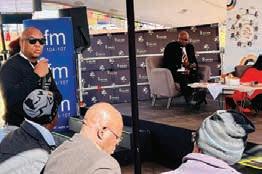
“SALGA’s work has not been exposed enough, along with the support it has provided to municipalities where there are pockets of excellence that we can point to,” says Jongizizwe Dlabathi, SALGA’s Gauteng provincial chairperson.
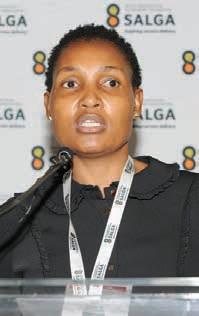
MUNICIPAL LEADERS MUST SET THE TONE
The campaign also follows the Auditor-General’s ndings that only 41 of the country’s 257 local municipalities received clean audits for the nancial year ending June 2021.
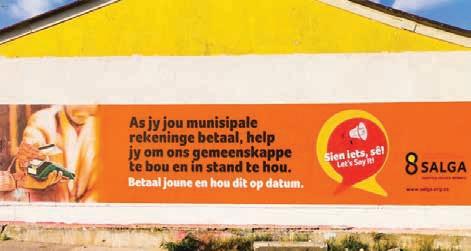
To enhance citizen trust and con dence in the municipal workforce, SALGA is conducting an internal Real Worker Municipal Champions campaign, which motivates municipal employees to reconnect with public service values such as transparency, accountability responsiveness, and humility.
Dlabathi recognises that for local government to be e ective, the municipal leadership must set the tone.
“Where there are failures, we need to zoom into the leadership itself. The leadership must be fed on issues of consequence management. Good leadership requires the discipline of implementation, and must ensure that certain things are not tolerated. Performance information must be accounted for and there must be zero tolerance in relation to nancial irregularities.”
Dlabthi points to Ekurhuleni Metropolitan Municipality, the only metro
in South Africa to receive a clean audit, as a good example of local governance. “The leadership in Ekurhuleni is clear that it does not want nancial irregularities, that it shall be nancially prudent and that supply chain management processes must be above board. And they were not found wanting when the Auditor-General came to them.”
WORKING TOWARDS A PEOPLE-CENTRED LOCAL GOVERNMENT

Asisho gives impetus to the organisation’s vision for the fifth term of democratic local government, which focuses on advancing a people-centred democratic local government. The campaign ows from the organisation’s 2022 national conference and 2022–2027 strategic plan to strengthen the role of local government in championing the social, economic, and material needs of their communities.
As Cooperative Governance and Traditional A airs (CoGTA) deputy minister Thembi Nkadimeng said at the launch of the campaign: “There are fundamentals that we need to appreciate undertaking, not only as CoGTA, not only as SALGA, but as South African citizens. Asisho gives communities the platform and, in turn, provides us the opportunity to be responsive to what communities want.” ▪

PLUGGED IN | ASISHO 17ISSUE 40 VOICE OF LOCAL GOVERNMENT THE PULSE
Asisho! will “give greater voice to residents on issues affecting their towns, cities, and communities and motivate and inspire a new approach to citizen collaboration with local councils that aims to build public trust and make local governments more accountable and collaborative”.
President of SALGA Councillor Bheki Sto le (seated) at the launch of the nationwide Asisho! Let’s Say It! campaign in Mamelodi.
CoGTA deputy minister Thembi Nkadimeng
Western Cape: Spine Road, Mitchells Plain
ARGOS-8 TO BOOST AIRBORNE DEFENCE



HENSOLDT launches its new ARGOS-8 lightweight airborne surveillance and targeting system. By Chris Haines, executive manager: Marketing and Sales at HENSOLDT Optronics

HENSOLDT South Africa launched the latest addition to its range of airborne electro-optical systems, the ARGOS-8. The sensor solutions house signed an agreement with THREOD Systems to collaborate in the joint development and future co-production of the ARGOS-8 airborne electro-optical system (EOS).

HENSOLDT South Africa exhibited its solutions at the Africa Aerospace and Defence Expo 2022, where it launched the new ARGOS-8 to the airborne defence and security market on the show’s opening day.
EXPANDNG THE RANGE
Based on the international sales success of the ARGOS-II, a 15-inch-class airborne EOS, HENSOLDT is expanding its range of airborne products to o er solutions in new size and volume segments. With a view to entering the smaller and lighter unmanned aerial vehicle (UAV) market, the ARGOS-8 is an 8-inch-class EOS with a mass below 6kg. Using HENSOLDT’s niche laser products, the ARGOS-8 is, like the
larger EO systems, equipped with a laser designator and range- nder capability. The visible day and cooled infrared sensors o er day and night operation for intelligence, surveillance and reconnaissance, as well as intelligence, surveillance, target acquisition, and reconnaissance missions.
The ARGOS-8 is based on complementary technologies residing within the two companies, allowing a very short time-to-market of a new product based on mature technologies. The requirement to accurately designate a target from a small UAV platform can be ful lled with ARGOS-8, which is designed to be an e ective EOS for smaller tactical UAV systems, thereby enhancing and signi cantly expanding the capabilities of these platforms.
“ARGOS-8 is not only o ered as a stand-alone EOS, but is also integrated onto the ASTUS unmanned aerial system, with production deliveries scheduled for 2023,” explained HENSOLDT Optronics’ chief executive, Deon Olivier. “Our co-operation with THREOD, an agile company with experience in designing and manufacturing smaller UAV platforms and
ABOUT HENSOLDT SOUTH AFRICA
HENSOLDT South Africa is a pioneer of technology and innovation in defence and security electronics. The company o ers a comprehensive range of products, systems and services across defence and civil markets, from electronic warfare and optronics, spectrum monitoring and security solutions to radar, IFF and datalinks. With more than 700 South African employees across ve sites in South Africa, it is the HENSOLDT Group’s largest industrial base outside of Europe and one of the largest defence and security electronics companies in South Africa.
ABOUT THREOD SYSTEMS


THREOD is an Estonian company based in Tallinn specialising in the development, production and operation of small, unmanned aircraft systems. In the aircraft segment, the company is an expert in hybrid systems – xed-wing electrical aircraft with the ability of vertical take-o and landing. The company also designs its own gimbal range and has in its product portfolio a universal pneumatic launcher capable of launching a broad range of UAVs from other manufacturers.
EOS systems, emphasises the importance of addressing customer requirements rapidly with the right partner.”
“The co-operation with HENSOLDT and the integration of world-class technologies in this new product will open markets for THREOD not previously accessible,” said Arno Vaik, CEO of THREOD Systems. ▪
Scan this QR code to go directly to the Hensoldt website.

For more information:
Haines
12 674
chris.haines@hensoldt.net www.hensoldt.net
IMAGES: SUPPLIED
18 VOICE OF LOCAL GOVERNMENT ISSUE 40 ADVERTORIAL | HENSOLDT
Chris
+27
0342
GENDER EQUALITY IN THE SPOTLIGHT
The SALGA Women’s Commission 2022 conference focused on the importance of gender equality and participation of women in local governance
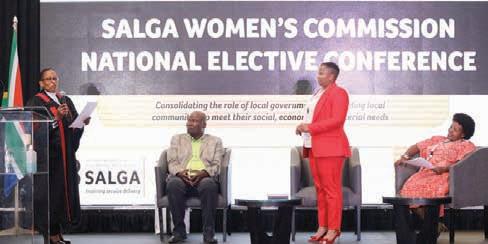
The pace of women’s inclusion in political decision-making at local government level has been stubbornly slow, and at times, has seen a worrying reversal of gains.
This comes as the representation of women in local government peaked in the 2016 municipal elections at about 41 per cent of elected councilors, but fell to 37 per cent following the November 2021 municipal elections.
Despite gender equality reforms across the public and private sector, women remain on an unequal footing in decision-making spaces across society, including the sphere of government closest to people’s everyday hopes and challenges.
On the continental stage, findings from the Women’s Political Participation: Africa Barometer 2021 published by Gender Links with the International Institute for Democracy and Electoral Assistance, revealed that women comprise only 21 per cent of councillors in Africa, 19 per cent of mayors of capital cities, and of the 54
capital cities on the continent, 10 are led by women.
These are some of the issues that came into sharp focus at the SALGA Women’s Commission (SWC) National Conference and Lekgotla, which took place from 24–26 August 2022 at the Birchwood Conference Centre in Boksburg, Ekurhuleni.
The SWC National Conference and Lekgotla, themed, “Women’s SocioEconomic Rights and Empowerment: Building Back Better for Women’s Resilience”, also elected a new national chairperson, OR Tambo District Municipality council speaker Ntandokazi Capa. Capa took over the reins from Flora Maboa-Boltman, who is currently serving as SALGA deputy president.
OBJECTIVES AND DISCUSSIONS

The SWC National Conference and Lekgotla provided a platform for leaders across all branches of national, provincial, and local government, Chapter 9 Institutions, the private sector, civil society, and the research
community to discuss key issues pertaining to women’s empowerment opportunities, women’s representation, and gender mainstreaming by municipalities, as well as to assess local government progress in meeting regional and international commitments for achieving gender equality. The objectives of the conference were positive and resolute.
• Elect the national chairperson of the SWC. Discuss the terms of reference on the functions and operations of the SWC and the multi-party women’s caucus.Induct the commissioners on the roles and responsibilities of the SALGA Women’s Commission.Develop a programme of action to guide the functions and operations of the SWC during the current term of office.
• Discuss current a airs pertinent to women empowerment and the gender equality debate.Discuss the patriarchal nature of our society and strategies to free women and society from the bonds of patriarchy. Panel debates at the conference focused on the following topics:
• Re ection on the status of women’s participation and representation in local government.Role of women in local government service delivery and local economic development.Institutional capacity building for women empowerment in local government.Patriarchy and municipal feminism.
A WORD FROM THE NEW CHAIRPERSON
At the closing of the conference, Capa said she was honoured to have been elected by her peers as the new SWC national chairperson. She said she looked forward to applying her experience as a local government leader to her role to address the challenges that women local government representatives face in the sector and in society.
“I am truly happy that you have accorded me this opportunity to lead. We will lead as a team to make sure that we advance women’s issues in local government. We appreciate what SALGA has done to give us this platform, but we must take it forward and make it a bigger platform,” she said. ▪
THE PULSE 19ISSUE 40 VOICE OF LOCAL GOVERNMENT IN THE HEADLINES | SALGA WOMEN’S COMMISSION
IMAGES: SUPPLIED
Council CAPA
NON-FINANCIAL CENSUS 2020: A MIXED BAG
The release of the preliminary results for the 2020 Non-Financial Census of Municipalities o ers valuable insights into the e ects of COVID-19 on service delivery, with the statistics re ecting a mixed bag of results for the country, writes DALE HES
MORE HOUSEHOLDS RECEIVING SERVICES
The number of consumer units receiving services from municipalities increased between 2019 and 2020, with sewerage and sanitation showing the highest percentage increase (4.3 per cent), followed by water (3.9 per cent), and then electricity and solid waste management both with (2.3 per cent).
A total of 12.8 million households had access to sewerage and sanitation and 14.1 million to water, with 12.8 million being provided with electricity and 10.5 million with solid waste management services.
In an o cial statement welcoming the release of the results, SALGA stated that it was heartening to note the increases, particularly regarding access to water and sanitation.
Investigating the provision of water, electricity, sewage and sanitation and solid waste management services, the Non-Financial Census of Municipalities (NFCM), carried out by Statistics South Africa, is a crucial indicator of local government’s performance. It is an important benchmarking tool to assess the ability of South Africa’s 257 municipalities to deliver on their core mandates, standing in contrast to, but also complementing, the nancial reports from the Auditor-General and indicators such as the Governance Performance Index. Using data gathered by phone, email or fax, the census examines the delivery of services, including free basic services, along with the number of indigent households, and provides a breakdown of employment gures at local municipalities.
“When it comes to government performance, the census is important to understand the social impact of policy and how the policy ultimately a ects the lives of people. This completes the picture in terms of addressing the main question relating to budgets – is government attaining value for money, and is policy e ective on the ground,” explains independent political analyst Ralph Mathekga.
The key ndings from the preliminary 2020 results show encouraging progress in some areas, but declines in others.
“The census is important to understand the social impact of policy and how the policy ultimately affects the lives of people.” – Ralph Mathekga
“This tells us that, despite the many challenges faced by local government, water services authorities are hard at work to ensure increasing access to water and sanitation to all communities in South Africa. In real terms, this means people who have never had these basic services in their homes now have access; it is an important milestone in realising the ideals cherished in our Constitution.”
DECLINE I N FREE BASIC SERVICES
Despite the overall increase in the number of households receiving services, there was a slight decline in the number of consumer units receiving free basic services in all performance areas apart from electricity. The Statistician-General, Risenga Maluleka, noted that the declines were largely due to changes in the targeting mechanisms used by municipalities to provide such services. SALGA said that lack of financial resources was also a stumbling block.
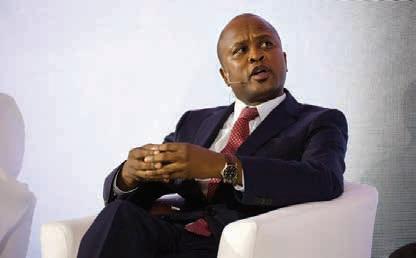
20 VOICE OF LOCAL GOVERNMENT ISSUE 40
Ralph Mathekga
“It is concerning to note that there was a decrease in access to free basic water and sanitation services. While this decrease can be attributed to changes in how municipalities determine who quali es for free basic services, it also means fewer existing consumers receive such services. This should not be interpreted as municipalities not wanting to provide services, but their nancial position making it impossible to provide such services,” SALGA stated.
INCREASE IN HOUSEHOLDS USING THE BUCKET SYSTEM
Despite the increases in sanitation services, bucket toilets provided by municipalities to households increased by a concerning 4 696 (11.1 per cent) consumer units, from 42 434 to 47 130 between 2019 and 2020. This follows several encouraging years of steady decline in the use of bucket toilets, including a 47.6 per cent decrease between 2018 and 2019.
The Eastern Cape’s Nelson Mandela Bay Metro topped the list of ten municipalities where bucket toilets are most prevalent with 12.8 per cent of total households utilising the system, followed by the Ngwathe and Matjhabeng local municipalities in the Free State, with 12.3 per cent and 10.1 per cent respectively.
On a provincial level, the largest percentage decrease in the number of households using bucket toilets was in the North West (-20.9 per cent), followed by the Western Cape (-14.0 per cent).
SALGA stated that municipalities, working with national and provincial governments, needed to work harder to eradicate the bucket system.
“It is not desirable to see an increase in the provision of bucket toilets (prevalent in informal settlements); we collectively understand the need for dignity in the provision of sanitation services. More e ort must be put into ensuring the dignity of all our communities.”
With the increasing pressures forced by COVID-19 and inflation, there were 3.6 million indigent households as identi ed by municipalities, an increase of 6.4 per cent from 2019. Of these, 2.7 million (75 per cent) bene tted from the indigent support system for water, 2.1 million from free basic electricity, 2 million from sewerage and sanitation, and 2.4 million from solid waste management.
PURPOSES OF THE NON-FINANCIAL CENSUS OF MUNICIPALITIES
• Assists in monitoring the progress made with regards to the implementation of service provision, free basic services and poverty alleviation as national priorities.
• Provides baseline non- nancial information from those institutions classi ed as municipalities in terms of the Local Government Municipal Structures Act, 1998 (Act No. 117 of 1998).
• Provides information that can serve as a framework for policymakers and other stakeholders for planning, as well as monitoring and evaluating the performance of municipalities.
• Allows national and provincial governments and other stakeholders to analyse the actual services provided by municipalities.
• Makes data available for use by researchers, organisations and individuals.
GENDER EQUALITY IN MANAGEMENT STILL A CHALLENGE
The census showed an increase in the number of people occupying permanent posts in municipalities, from 266 047 to 270 545. Local government has made good headway in filling vacant posts, with this number declining from 53 569 to 30 426.
Notably, there was an increase in the number of male mayors, from 164 to 172, while female mayors declined from 87 to 81. Maluleka highlighted that government was still some way o its target of reaching its gender equality targets. “On the executive mayor level, only 32 per cent of these posts are lled by women, compared to 35 per cent in 2019. The results indicate that local government still has some way to go to reach its 50-50 target.”
RESULTS SHOULD INFORM BETTER DECISION-MAKING
Dissecting the results, Mathekga said that the improvements were commendable, but pre-existing service delivery standards needed to be taken into account.
“This is a notable improvement, but the baseline is a concern here; we start from a very low base of desperate need for those services.”
Mathekga warned that population expansion in urban areas would place even more strain on the ability of local government to deliver effective services.
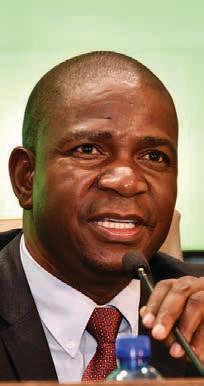
“Rapid urbanisation would place urban municipalities under strain as marginal improvements in terms of improvements of life are overwhelmed by rising demands in cities. A more focused approach is necessary to change things radically. There is more evidence of deterioration, which makes the improvements outlined in the census look marginal.”
Statistician-General Maluleka said that the results of the census will provide information that can serve as a valuable framework for policymakers and other stakeholders for planning and monitoring.
“This report assists members of the community and the people they elect to office to engage in discussions. Our job is to share this information with stakeholders in government and society, and scholars, so that they can engage one another.” ▪
IN THE HEADLINES I NON-FINANCIAL CENSUS THE PULSE 21ISSUE 40 VOICE OF LOCAL GOVERNMENT IMAGES: SUPPLIED
Risenga Maluleka
MORE MUST BE DONE, NOW
By Sue-Ellen Donough
For a long time, it has seemed as though the words “gender equality” were bandied around without the sense of any real action to support it. This happens to the point of cheapening the meaning, while the consequences of not achieving gender parity, namely educational and employment inequality, unequal pay for women, teenage pregnancies, and gender-based violence, continue to impact society.
A Stats SA’s report on unemployment rates in South Africa reveals that the unemployment rate for men is 31.4 per cent compared to 34 per cent for women – a travesty when acknowledging how many homes are led and managed by women.
The 2019 Governance, Public Safety and Justice Survey (GPSJS) shows that only 55.6 per cent of males believed that earning an income was the best way for women to be truly independent. The reality of cognitive distortions is further identi ed in the fact that
approximately 64.7 per cent of South Africans believed that women earning more than their partners would cause trouble – 67.5 per cent of males and 62.2 per cent of females agreed with this statement.


In 2019, almost 6 per cent of girls between 14–19 years of age were at different stages of pregnancy during the 12 months before the survey. Young girls may be allowed to attend school while pregnant, but financial challenges, a lack of family support, discrimination, and victimisation within their communities are threats to the educational development of these girls. The evidence suggests that women who had their first birth between the ages of 15–24 are less likely to attain a tertiary qualification.
What all this tells us is that there is still much work to be done. Any influence that leaves women behind when it comes to safety and socioeconomic opportunities is a step in the wrong direction because it limits girls and women from enjoying their basic human rights.
22 VOICE OF LOCAL GOVERNMENT ISSUE 40
Mayor Tania Campbell, executive mayor of the City of Ekurhuleni Metropolitan Municipality, weighs in on the slow pace of gender transformation within local government.
CHANGE IS COMING, BUT IS IT FAST ENOUGH?

So where do we begin? South Africa is part of the global movement toward achieving gender equality by 2030. In June 2021, the Inter-Parliamentary Union ranked South Africa 11th in the world for women’s representation at a parliamentary level, while the World Economic Forum’s annual Global Gender Gap Report scored South Africa 14th in the world in terms of political empowerment in 2021.
Change begins at the top and living in a country where gender equality is a key performance indicator is a good thing. We have women in leadership positions at every level of government and we need them there to put women’s issues on the agenda. But how easy is it to make your mark, as a woman, in a historically patriarchal institution?
Commenting on the progress municipalities are making toward achieving gender parity, Tania Campbell, executive mayor of the City of Ekurhuleni Metropolitan Municipality, says: “In recent years, women have become more aware of their untapped potential and capabilities. Globally, the representation of women in national parliaments has increased over the years. In South Africa, we have witnessed an increase in the number of women occupying seats in parliament. Before 1994, women made up a mere 2.7 per cent representation in parliament, today, over 40 per cent of parliamentarians are women. As one of only two females to be elected executive mayor of the City of Ekurhuleni, I wish more women are given opportunities in leadership roles both in political, public, and private sectors across the African continent.
“There has been a political shift for greater female representation in municipal councils as well as in political caucuses. In the City of Ekurhuleni, I am proud to lead a city that has appointed a female city manager, Dr Imogen Mashazi, and continuously works to empower women within the city.
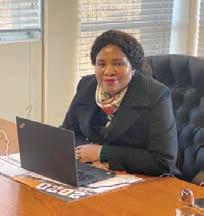
“It is critical to promote gender equality as it creates the necessary foundation for social change, new bold ideas, and di erent ways of thinking. Women can make a positive impact on politics and society in general and it is therefore imperative for municipalities
to work faster to realise gender parity at this level of government as it is directly linked to communities where such changes also need to be re ected.”
IS FEMALE REPRESENTATION IN MUNICIPALITIES REFLECTIVE OF SOUTH AFRICAN DEMOGRAPHICS AND SOCIETY’S NEEDS?


Campbell says she has seen the strides that have been made to advance the involvement of women in leadership and management roles in municipalities, but acknowledges that more still needs to be done to achieve gender parity in local government in general.
“Women are equally capable to deliver on all these leadership roles in politics. As cliched as it may sound, it has been proven over and over again. As a society, we need to invest in mentorship programmes to empower women to realise their leadership potential, as we are doing in the City of Ekurhuleni. While the political sphere has its challenges, it is still possible for women to make their mark through hard work and dedication to the communities they serve.”
Campbell has certainly walked her talk: she has spent over 25 years in politics with a focus on serving communities. She admits that it has not been easy even though she has aligned herself with people and political organisations that encourage and foster strong female leaders.
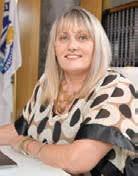
narrative
“The under-representation of women has a lot to do with our societal history, which is prone to trusting and promoting men more often than their female counterparts. Further to this, local government involves the delivery of service, which is largely viewed as physical work (for example, repairing potholes and streetlights) and generally considered to be male-dominated work. This is an important narrative to change, and as change leaders, we must begin changing this narrative through dialogue and education.”
Campbell further clari es that women leaders still face many unique challenges brought on by a combination of social and cultural stereotyping, gender bias, and discrimination. “Women continue to face discrimination. Unfortunately, preferential treatment and stereotypes about women still exist in our modern society.
“My consistent and continuous efforts are about living out my true principles – social justice and serving the people. The positions I have been elected to have always come with great responsibility where I was entrusted to serve and lead, which I have always done to the best of my abilities. I believe in growing individuals and mentorship to foster future leaders.“ As a woman leader, I deal with the challenge of balancing family and work life. Women often have to sacrifice family time in pursuit of career advancement. Then different pressures are placed on them at home. It’s crucial to strike a balance.”
A notable conclusion by Stats SA is that empowering our women is the key to reducing poverty and food insecurity. While we have made progress, there is still much work to be done. Service to our communities and our involvement in the decisions that impact us mean that we can be part of the solution. ▪
RESOURCES: Unemployment Rates by Gender report


IN THE HEADLINES I GENDER EQUALITY THE PULSE 23ISSUE 40 VOICE OF LOCAL GOVERNMENT IMAGES: SUPPLIED
Tania Campbell
Dr Imogen Mashazi
ZERO-TOLERANCE GBVF PROGRAMME
The same as any “virus” infecting a community, gender-based violence and femicide (GBVF) is present 24 hours a day, 365 days a year, and is not selective about those it targets. As with any society-based ailment, it cannot be tackled e ectively unless its existence is acknowledged, and people band together to nd solutions and structure programmes to prevent its spread.
This may sound like a call to “community action 101”, but when you regularly have more than 100 cases of assault and 49 incidents of rape reported to your organisation every month, ghting this scourge is not easy. This is perhaps even more challenging if your organisation operates in a remote rural area comprising more than 100 villages housing about 600 000 people.
However, for the Thohoyandou Victim Empowerment Programme (TVEP), this is a challenge that has not only been met, but has also set international standards.
For Thohoyandou and the Thulamela Municipality in Limpopo, about 500 kilometres from Johannesburg, this has meant that problems such as HIV/AIDS, sexual assault, domestic violence and child abuse are now constructively addressed.
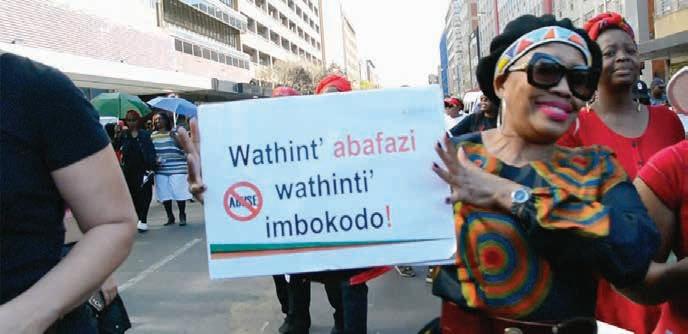
“TVEP has a staff of 44, of whom 38 are women. This means we can reach out to women who are most often the survivors of GBV, identify and sympathise with them, and help them to find solutions,” says Fhatuwani Manthada, project manager: access to justice and trauma services at the nongovernmental, community-based organisation (CBO).
CARING ASSISTANCE AND EDUCATIONAL PROGRAMMES
Help begins with ensuring that women can report abuse at the two TVEP trauma centres located at the regional and local hospitals. Through its relationships with the South African Police Service (SAPS), the Department of Health and the Department of Social Development, TVEP ensures that women who are being abused are supported through the medical, legal and counselling process. Keeping in touch with the survivor, making home visits, and o ering a “shoulder to cry on” through a daunting process is a “TVEP buddy” who assists the survivor for as long as is required.
Assistance usually involves the provision of clothing, medication and accommodation for up to a month for women who cannot go home because of the personal risks involved.
24 VOICE OF LOCAL GOVERNMENT ISSUE 40
Lindi Dlamini, CEO of the GBVF, shares the important work and impact of a community-based organisation in the ght against gender-based violence and femicide in Limpopo
“Women who involve us through visits to our o ces or trauma centres do not need to spend time at a police station. We have an agreement with SAPS that they will come to our centres within two hours to get the complaint details. Doctors respond to medical calls within 30 minutes, and trauma counsellors and social workers are constantly on hand while we work with court prosecutors to keep criminal investigations and action on track,” says Manthada.

While each survivor is assisted and supported according to her needs, the unique Zero-Tolerance Village Alliance and the Zero-Tolerance School Alliance programmes are at work in the background. They o er interventions, education and action for those who wish to become involved in making their villages safe and happy places.
background.



Following what are considered to be standard processes in rural areas, the village chiefs, local leaders, school principals and teachers are sought out to lead the programmes. Following education programmes and the distribution of material designed to alert and inform community members of their rights, all participants sign pledges in which they commit themselves to not perpetuate or participate in GBV or hide facts regarding violence imposed by others.
Sworn to in public and accompanied by signing the pledge and registering participants, the ceremony is led by a magistrate. These types of events have proved e ective in reducing GBV reports in at least 11 villages in the area. Leaders compel those who transgress after signing the oath to leave the community.
“Up to now, we have had only one person who has broken the pledge,” says Manthada, who adds that TVEP carefully selects the villages it approaches for the ceremony. “We check statistics to nd out which areas have recorded the most GBV cases and approach the leaders. In most cases, they take our interest and the health of their communities to heart and welcome us to their areas. “There are, however, times when our approaches are refused on the grounds that we are interfering with events typical of rural patriarchal societies that are none of our business,” adds Manthada.
SUCCESS AND RECOGNITION BOOST FUNDS

The proof of the programme’s success is underscored by its adoption by the United Nations (UN) High Commissioner of Refugees in Rwanda and Uganda.
It is currently being applied in four villages in Uganda.
In the meantime, learners between the ages of 13 and 21 at 13 secondary schools in Limpopo are being taught about treating others with respect.
They have adopted and taken their own version of the pledge as part of a pilot programme supported by the Department of Education.
For Manthada, having the GBVF Response Fund (the fund) identifying their organisation as one of the 110 high-impact nonprofit South African CBOs for funding has provided a boost to their work, enabling them to continue making an impact despite a loss of staff and income caused by the COVID-19 pandemic.
“We are truly grateful for this assistance, which is helping us serve the community while we face the challenges of locating new, more affordable office space and finding new donors,” says Manthada.
The other beneficiaries of the fund’s first tranche of R69-million, allocated to the 110 CBOs, will be the women and other members of communities in the area suffering from similar social problems to Thohoyandou.
Commenting on the role and successes of TVEP, Lindi Dlamini, CEO of the GBVF Response Fund, says: “In the fund’s role to act as a catalyst to accelerate action in the ght against GBVF, we are immensely pleased to see how TVEP is putting its funding to such positive and innovative use. It is not easy to break through in areas where there are such strong and embedded ‘norms’ linked to patriarchal societies and practices. TVEP has made some signi cant strides in this regard. It is also very encouraging to see this innovative approach to a ‘traditional’ mindset being applied outside of South Africa. Additionally, it is certainly heartening to see that emotional support is being translated into practical action and that this CBO is proactively making communities aware of the problem and helping them take action to improve the lives of residents. TVEP’s ties with the local SAPS and other partners o ering support to women in the area illustrates what can be achieved when multiple stakeholders co-operate for the bene t of others.” ▪
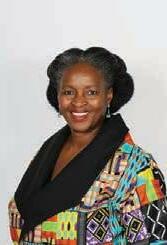
RESOURCES:
To nd out more about TVEP, visit or follow: Website: www.tvep.org.za Twitter: TVEPSA Facebook: TVEP victim empowerment Instagram: tvepSouthAfrica YouTube: Thohoyandou Victim Empowerment Programme TVEP SA
THOUGHT LEADERSHIP – GENDER-BASED VIOLENCE THE PULSE 25ISSUE 40 VOICE OF LOCAL GOVERNMENT IMAGES: SUPPLIED
and us
Lindi Dlamini
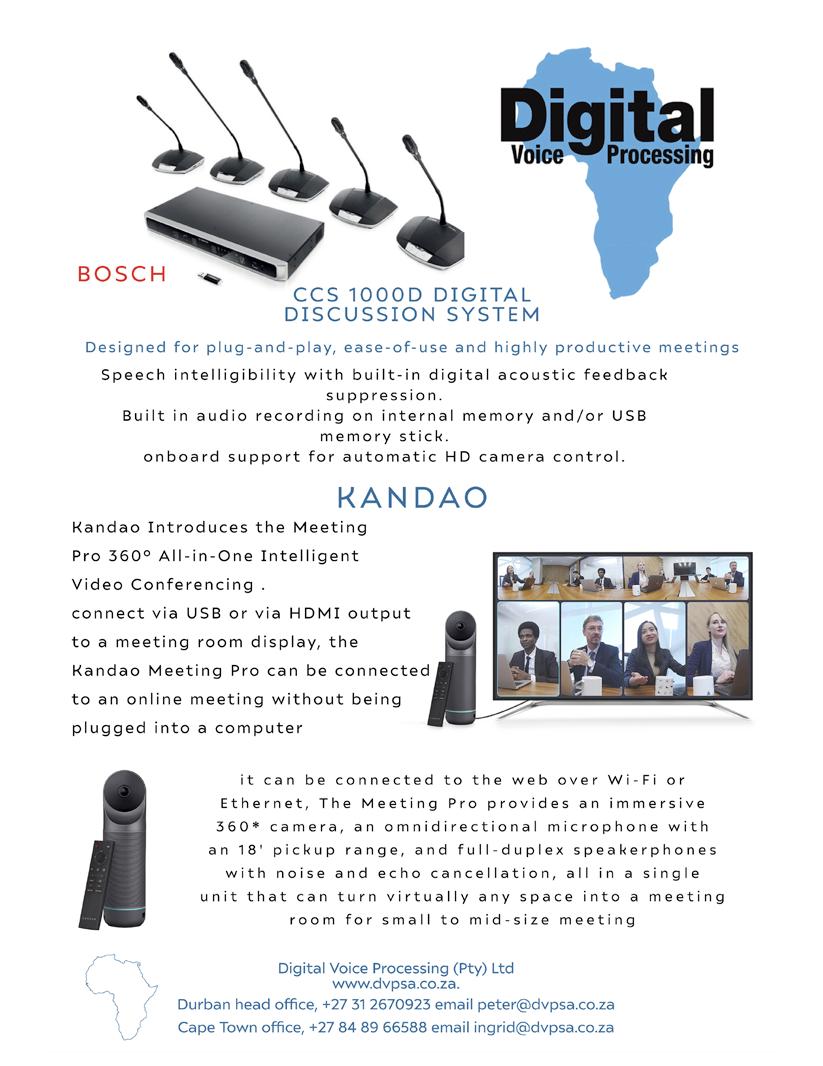
WHY DIGITAL INCLUSION AT LOCAL MUNICIPAL LEVEL IS SLOW
Acommon joke in many government departments’ front o ces is that “the system” is often o ine, but for a citizen seeking urgent government services, this can be no laughing matter. That negative narrative should be of great concern as the purported system instability directly impacts its ability to perform the functions needed to render sustainable and reliable service capability to frontline o ces.
Chief digital o cer at SALGA Digital Kutlwano Chaba says most municipalities have not devised digital strategies that deal with a technology-driven municipal programme.
“This is what SALGA Digital uncovered in the digital maturity assessments we have conducted on over 50 municipalities to date,” says Chaba.
He says that municipalities’ ICT strategies generally address governance and internal technology operations. They therefore come a bit short in repositioning the digital or ICT function as critical in enhancing the municipalities’ service delivery mechanisms and developmental objectives.
“The digital maturity assessments we conducted are not only used to determine gaps and assess the current state of a airs, but also inform the required interventions needed to achieve digital maturity within those municipalities,” says Chaba.
“For example, a positive discovery in some of the last 20 assessments is that we have seen a strong drive by municipal leaders for a more aggressive posture in how ICT should be viewed and used to transform both the administration and the services rendered.”
Kevin Morake, Cooperative Governance and Traditional A airs (CoGTA) director for communication, IT and auxiliary services in the Free State, says building a business case for investing in digital inclusion is not as simple as convincing the nance department to make budget provisions.
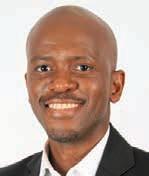
“It’s a complex method that requires inspecting every single IT aspect, each of which deserves its own special attention, from operating systems, connectivity, computing, and back-end support right up to employing the right human capital with quality IT skills.

“All these components would need their own business case,” Morake emphasises.

MUNICIPALITIES’ BUDGET CONSTRAINTS
Morake says even though all three tiers of government agree that migrating to digital is an important service delivery step because it creates e cient and fast responses to service delivery matters, budget constraints remain a challenge.
“It makes progressive and productivity sense for CoGTA, for example, to want to migrate to a digital environment to ensure e cient service delivery and overall digital inclusion. But, as things stand, IT budgets often fall short, especially if we are talking about deploying the latest technologies,” says Morake.
Echoing the same sentiment, Chaba says that municipalities are already strained nancially and are not always able to fund all key programmes. And, areas of technology tend to receive less priority, especially in municipalities that have basic service backlogs, as well as those in remote and deprived areas.
“We have seen that most ICT budgets, as a percentage of municipal opex (operating expense), sit below 1.5 per cent and below 2 per cent on capex (capital expenditure). This could be seen as an acceptable amount for digitally mature environments.
“However, most municipalities still have old infrastructure and applications, which means that their requirement budget needs to be more than five per cent for at least two years to roll out modern technologies required for
digitally transforming and reimagining the municipalities,’ says Chaba.
SOME INITIATIVES UNDERWAY
Despite the challenges, positive steps to improve digital inclusion are being taken.
Morake says during and in the aftermath of COVID-19, for CoGTA and other local government departments, digital inclusion as far as being able to communicate e ectively internally and externally was and remains paramount.
“This helps solve simple issues such as cutting down on travel time and saving on fuel spending.
“For example, the use of the MS Teams platform enabled us to communicate e ectively externally with customers, and we were able to congregate virtually to ensure productivity was not disturbed. That is one way we have ensured the digital inclusion of all relevant stakeholders,” says Morake. Chaba says they are rolling out several pilot systems and applications to address the most common problem areas across the sector as informed by the assessments.
“A growing number of municipalities are introducing technologies for citizen engagement. Some are beginning with their big data and analytics programmes, which is very exciting for us as this is in line with our strategic posture as SALGA Digital.
“Lastly, we are also framing a new business model for a broadband service that municipalities can adopt in ensuring more rapid deployment of connectivity infrastructure and its associated services,” Chaba concludes. ▪
27ISSUE 40 VOICE OF LOCAL GOVERNMENT THE PULSE IN THE HEADLINES I TECHNOLOGY
In some nancially strained municipalities, the digital function is often overlooked in favour of other key programmes, writes Itumeleng Mogaki
IMAGES: SUPPLIED
Kutlwano Chaba
NEW TECHNOLOGIES
HELPING RETHINK HOW GOVERNMENT SERVES CITIZENS
There is no doubt that technology is driving a wave of economic and social change. The statistics are literally astronomical: There are more bytes of data than stars in the observable universe, and government can apply arti cial intelligence (AI) to this data to save up to 1.2 billion hours of work.
These technological advances are changing how governments can deliver their services, from ensuring food safety to carrying out gambling inspections, issuing key documents, and more. Virtual inspections and licensure hearings are speeding up approvals and increasing the reach of individual inspectors. Similarly, AI and big data analytics have been applied to problems ranging from building code violations to nancial fraud investigations, resulting in the saving of both lives and budgets.
New technology is about enabling government to meet the ever-increasing demands of its people. But, to truly take advantage of these new technologies, government will have



to fundamentally change how it delivers services to citizens. AI is today’s version of the rocket: an exciting new technology, but one that can’t simply be grafted onto existing business models.
Take AI-enabled chatbots, for example. These can be incredibly valuable tools to help people navigate complex processes or quickly nd relevant information. But simply adding a chatbot to a traditional government webpage full of text information will not be very valuable.


28 VOICE OF LOCAL GOVERNMENT ISSUE 40
Elsabe Booyens, CEO of Lehaeng Technology, shares that technological advances are changing how governments can deliver their services
The most impactful innovations, whether in government or in industry, come about when multiple transformations work together.
It might sound cutting-edge, but it doesn’t really add anything of value. It makes little di erence to users whether they read text in the website window or the chatbot window. Just adding AI to existing ways of doing business will often result in services as awkward as rocket mail.
To avoid failure of this innovation, government should think creatively. Ways of delivering services that were once discounted as impossible may suddenly be possible as new technologies burst onto the scene.
Think about a bank or merchant asking for your driver’s licence. The merchant doesn’t really want to know that you can drive a car or if you are an organ donor; they just want a government-backed means of verifying your identity or age.
Previous innovations around identity mostly focused on improving the existing driver’s licence, making it plastic instead of paper, adding anti-fraud features, and so

on. But now, new technologies are opening the possibility for entirely new forms of identi cation. New temporary digital IDs take advantage of advances in cloud, mobile computing, and cryptography to o er government-backed identity veri cation that is temporary, revocable, and shareable. It meets the needs of both citizens and merchants in a way that simply modifying old, plastic ID cards never could.
GOVERNMENT: GOOD AT EFFICIENCY, POOR AT INNOVATION
Creating new processes or interdepartmental relationships may seem simple when weighed against the great potential bene ts they can bring to citizens, but such changes go completely against the grain of innovation in government. Any organisation can become set in one way of doing business, and it often takes a signi cant jolt to shock it into adopting new business models.
In the private sector, where innovation is focused on creating new and improved products, an innovative new product can be that spark. This is exactly what happened in the industry with the emergence of cloud. The ability of cloud to quickly scale up and down allowed software companies to adopt new payper-use business models for which their clients don’t have to purchase copies or licences.
Unfortunately, government tends not to innovate that way. Rather than evolving around its core product – service delivery –government’s innovations tend to re ne the
A PRACTICAL EXAMPLE
Let’s look at getting a birth certi cate. Typically, this involves lling in a form and a trip to a government department. However, many governments have begun to proactively issue birth certi cates. Rather than waiting on new parents to ll out forms, government systems know from health data when a couple has a newborn and will need a birth certi cate. The parent simply needs to click to con rm. No forms, no waiting in line.
e ciency of current models. The result is that one of the key motivators of adopting new models – such as a di erent delivery system –is lacking. Government is therefore more likely to try and graft new technologies onto old methods, leading to utter failure. Improving only the process that delivers services can lead governments to deliver the wrong service.
Organisations tend to think of innovation narrowly. Government may be inclined to think of innovation as improving current processes while many commercial companies default it to just creating new products. But both of these are only one way to innovate.
The most impactful innovations, whether in government or in industry, come about when multiple transformations work together. For example, the USA Transportation Security Administration’s Precheck®. It was not just a new service allowing precleared travellers to have a faster security experience. Its success relied on innovations elsewhere. It needed an expanded network of airlines to reach travellers through new channels – having their “precheck” status printed on their boarding pass, for example. It introduced a faster customer experience and a new brand to go with it in the form of the PreCheck wordmark.
It even gave the United States government a new source of funding to reinvest in security as passengers paid US$85 for the new service. The success of PreCheck would not have been possible with only one of these innovations. It relied on all these innovations working together to deliver a new service to citizens.
TAKE ADVANTAGE OF SYNERGIES IN TECHNOLOGY
Falling victim to the “it’s always been done this way” trap is an age-old challenge. But, luckily for government, the current time may o er one of the best opportunities to break out and discover new ways of doing business. Technologies of the fourth industrial revolution are coming together to transform everything about how we live. These technologies are the engine of transformation, and understanding how they work together can help government leaders innovate e ectively. ›
THOUGHT LEADERSHIP – TECHNOLOGY THE PULSE 29ISSUE 40 VOICE OF LOCAL GOVERNMENT
Today’s technologies do not exist in isolation – they almost always work in conjunction with each other. For example, it’s rare to nd AI working without cloud to provide the vast volumes of data it needs. In fact, 83 per cent of enterprise AI runs in the cloud.
So, while modern technologies can be valuable on their own, their real transformative power comes when they work together. Virtual reality (VR) by itself is just an interesting add-on for gamers. But in combination with AI and the digital twins of a city’s transit system, VR can become a serious tool that can transform everything from city planning to defence wargaming.
Identifying the synergies in new technologies can be the rst step to uncovering entirely new ways of delivering government services. For example, with the COVID-19 pandemic forcing so many in-person government services to close (at least temporarily), many agencies took advantage of the cloud to quickly pivot to a virtual footing. But the move to the cloud didn’t just allow work to be done remotely; it also allowed government to layer on new automation tools to deal with surges in
volume for services such as unemployment insurance or health questions. Governments can even use these technologies to reach citizens in new ways with chatbots that are integrated into digital assistants so that citizens can query government services in their own voice.
Identifying the synergies in new technologies can be the rst step to uncovering entirely new ways of delivering government services. The adoption of one technology does not have to solve only one problem. One technology can work with other innovations to improve many aspects of government service at the same time. Government must think beyond a single technology while trying to uncover entirely new models of service delivery.
New technologies are shifting the limits of what is possible. At the same time, social and economic trends are largely changing what citizens need. Innovation in service delivery is needed if government is to meet the needs of its citizens e ciently. The future of government service delivery depends on leaders taking an active and structured approach to not only improve “how” services are delivered, but even “what” those services are.
UNCOVER WHAT NEEDS TO BE DONE Perhaps the strongest challenges to nding new ways of doing business are the preconceived notions about how work needs to be done. Once government selects a service delivery model to meet a particular need, it can lead to a sort of mental “lock-in” where leaders assume that the need can only be met by that service in that particular form.
For example, in the late 19th and early 20th centuries, public libraries began to spread globally with the goal of promoting culture and education among citizens. The way to achieve this goal was to house and lend books, leading many libraries to make the lending of books their core mission. Yet, shifting trends in where citizens nd information means that now, people are about as likely to use the library for Wi-Fi as for books. As these trends continue to shift, the library’s goals may be better met by meetings
and classes or by becoming a trusted veri er of information in today’s environment of misinformation/disinformation.
The example of libraries shifting services exempli es how government needs to understand the “job” citizens need to be done. Citizens do not want a government service, they want a “job” done, and government service delivery is just one way of accomplishing that. For example, citizens don’t necessarily want a re department, they want buildings not to burn down – there are many ways to accomplish that. The challenge is that mental challenges (such as functional xedness) can limit us to seeing familiar tools or services as the only way to do that particular job.
If government leaders want to take advantage of new technologies to meet citizens’ needs in new ways, they need tools to help them break those mental challenges and see the various ways of delivering services to citizens.
Templates laying out goals and all the resources available can be valuable tools in helping government to view familiar problems from new angles and nd a vision for service delivery unconstrained by “the way it’s always been done.”
TREAT TECHNOLOGIES TOGETHER, NOT AS DISCONNECTED TOOLS
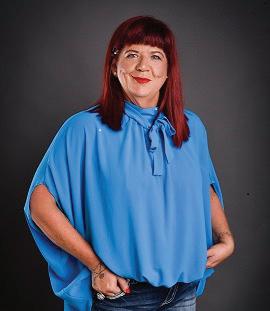
Technologies have never existed in splendid isolation. A nail is more or less useless without a hammer, or even the wood it’s meant to hold together. But the convergence of today’s digital technologies has taken this to an extreme degree. As a result, government leaders should not just think about purchasing only the AI or only migrating to cloud, but also how those technologies interact and what opportunities – and cyber vulnerabilities –they create for each other.
Governments should always be evolving and innovating. The current time o ers exciting new possibilities. But to make sure we make the most of these possibilities, we need to consider thinking di erently and be open to entirely new models of government service delivery. Success in doing so could be the rst step toward a truly digital government. ▪
Technologies of the fourth industrial revolution are coming together to transform everything about how we live. These technologies are the engine of transformation, and understanding how they work together can help government leaders innovate effectively.
30 VOICE OF LOCAL GOVERNMENT ISSUE 40
THOU G HT LEA DE R SHIP – TECH NOLOGY THE PU L SE
Elsabe Booyens
IMAGES: SUPPL IE D
AND STREAMLINING VAT RECONCILIATIONS
A new VAT reconciliation bot will help cash-strapped municipalities simplify their VAT administration and recover unclaimed revenues. It enables municipalities to customise functionality and outputs and extend robotic process automation into supporting processes to create a fully automated business process. FIRtech CEO Ugan Maistry explains the technology

FIRtech’s VAT Reconciliation bot’s ability to mimic human actions is the most decisive attribute elevating robotic process automation (RPA) to the most appropriate technology for VAT reconciliation. This tool automatically generates a VAT reconciliation report that can be reviewed by humans.
Cash-strapped municipalities are missing obvious opportunities to recoup unclaimed taxes. Often, they are focused on bigger budget items, but they need to realise that one obvious answer to cash preservation is hiding in plain sight.
Local authorities consume goods and services from the private sector to provide services to the public. These goods and services attract VAT, but the municipality does not levy VAT on all of its services to the public. This means there is a massive imbalance between the input and output tax, in other words, taxes paid versus taxes charged.
The incentives for the execution of exhaustive and accurate VAT reconciliation surpass that of naive compliance; the products thereof can ensure substantial savings by minimising erroneous overpayments of VAT obligations within payment periods and guarantee maximum recoveries of any overpayments at the close of the tax year. Furthermore, underpayments result in penalties and interest. That a robust VAT reconciliation system is essential in any business is undisputable, however, contemporary businesses continue to seek e ective solutions primarily due to the high dependence on irreplaceable human capabilities at several points in the VAT reconciliation process.
CURRENT VAT RECONCILIATION CHALLENGES
The challenges many municipalities face to resolve their VAT reconciliation woes include:
• The requirement to deploy a multitude of specialised skills to obtain a nal reconciliation (IT personnel, data analysts or engineers, accountants and auditors, admin personnel and clerks).
The VAT reconciliation process works across
• The long lead times required to prepare reports for physical investigation (extending to months in most cases).
• The inaccuracies that proliferate the final review reports.
• The need for perpetual management oversight of the VAT reconciliation process.
• Auditors have to resort to a sampling of the set of transactions to validate the robustness of the business systems.
HOW IT WORKS
The VAT reconciliation process works across legacy enterprise resource planning systems (ERPs), mainframes, custom applications, desktop applications, and all other IT platforms. Any technology platform that can be utilised by a human can also be navigated by an RPA robot.
It leverages other application software through the existing application’s interface; therefore, it is not technically integrated. Since complex integration is not required, RPA programs can be launched in a matter of days or weeks, resulting in a low cost of implementation and a high return on investment.
Furthermore, it is nondisruptive; the municipalitiy’s’ core technology remains intact. It is extremely versatile, and able to process a variety of input le formats and con gurations. More importantly, it is nonintrusive, in that it does not require specialised integration into existing systems.
The VAT Reconciliation bot is modular, so it allows one to extend the functionality as per client requirements, for example, retrieve ledgers from ERP systems, and read, validate and reconcile documents using customised machine learning models.
In conclusion, it reduces the lead times for the generation of a VAT reconciliation report from months to hours. Software bots do not introduce subjectivity in a process, they are extremely accurate and require minimal management oversight or specialised skills to operate. ▪
enterprise resource planning systems, mainframes,
and all other IT platforms.
THOUGHT LEADERSHIP – TECHNOLOGY 31ISSUE 40 VOICE OF LOCAL GOVERNMENT THE PULSE
IMAGES: SUPPLIED
legacy
custom applications, desktop applications,
SIMPLIFIYING
Ugan Maistry



LOCAL GOVERNMENT MUST BE PROFESSIONALISED
The Auditor-General is correct to lay the blame squarely on the shoulders of municipal leaders, but perhaps we need to be talking about professionalising municipal management as well.
There’s a reason that King IV’s first principle concerns leadership because ultimately everything stems from what goes on at the board or council level. Principle 1 speaks to the absolute need for ethical leadership, while Principle 10 deals with the imperative to delegate the council’s authority to a competent municipal manager on whom it can rely.
King IV’s sector report on municipalities further recommends that councils ensure they have access to “professional and independent guidance on corporate governance and its legal duties” (King IV, p 85).
The theme of the Auditor-General’s Consolidated General Report is “Capable leaders should demonstrate change by strengthening transparency and accountability”.
ARE THE RIGHT LEADERS IN PLACE IN MUNICIPALITIES?

The corollary is that we have now to ask whether municipal councils and audit committees have the right leadership of ethical and e ective leaders.
What criteria are used to appoint municipal councillors, and do we know
precisely what competencies they need to have to discharge their duties properly?
As the Auditor-General pointed out in her report, senior municipal management has been dilatory at best in implementing the detailed recommendations contained in previous reports.
This state of a airs seems to be the result of decades of incompetence and even criminal behaviour. However, as noted, the buck stops with the municipal council.
Building up a cadre of professional municipal officials who have current and relevant skills, and who can be held to account rapidly via a professional code of conduct might be something to seriously consider at this point.
Councils are gravely at fault because they do not hold senior management to account for how they ful ll their duties, and they should, in turn, be held accountable.
Constitutionally, the national and provincial governments are bound to assist in strengthening and supporting municipalities to operate e ectively (Constitution of the Republic of South Africa, 1996, s154(1)).
Section 139 sets out how, in extreme cases, provincial governments can intervene in local government.
But given that these interventions do not necessarily seem to solve the problem, not least because everything is so politicised, are we now not overdue in simply professionalising local government? Municipalities are where most of the really important service delivery actually occurs –or doesn’t occur. As we seem to be entering a period of unstable municipal coalitions, which could make the council’s leadership role even less e ective, building up a cadre of professional municipal o cials who have current and relevant skills, and who can be held to account rapidly via a professional code of conduct might be something to seriously consider at this point.
RESOURCES:
For more information on the IoDSA, visit: Website: www.iodsa.co.za Twitter: @The_IoDSA LinkedIn: Institute of Directors in South Africa Company Page Facebook: Institute of Directors South Africa
THOUGHT LEADERSHIP – LOCAL GOVERNMENT 33ISSUE 40 VOICE OF LOCAL GOVERNMENT THE PULSE
▪
Parmi Natesan, CEO of the Institute of Directors in South Africa (IoDSA), writes that the recent report on local government by the Auditor-General, Tsakane Maluleke, is a timely reminder of the prevailing dysfunction in municipalities across the country, and the catastrophic impact it is having on all South Africans
IMAGES: SUPPLIED
Parmi Natesan
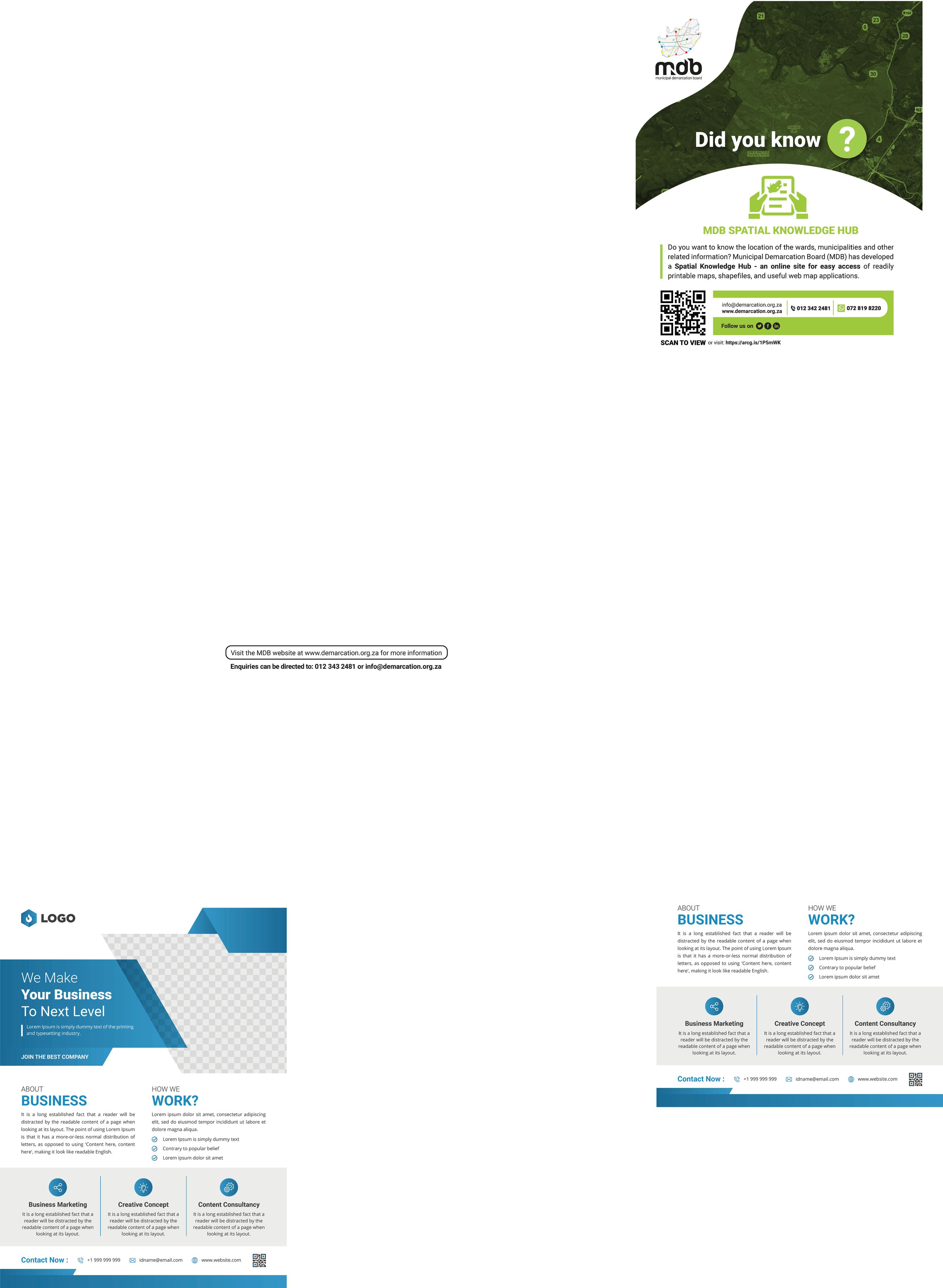
The
is currently
and is implemented in terms of the Municipal Demarcation Act (MDA) of 1998 and other appropriate legislation enacted in terms of Chapter 7 of the Constitution. To date, the board has considered all views and representations received during July and August 2022 and resolved to redetermine the Class 1 (Technical & minor)
in terms of section 21 of the Municipal Demarcation Board (MDB).
Members of the public/any person aggrieved by the redeterminations are invited to submit their objections in writing to the MDB within 30 calendar days from the date of publication.
Eastern
KwaZulu

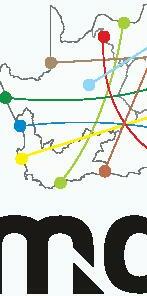
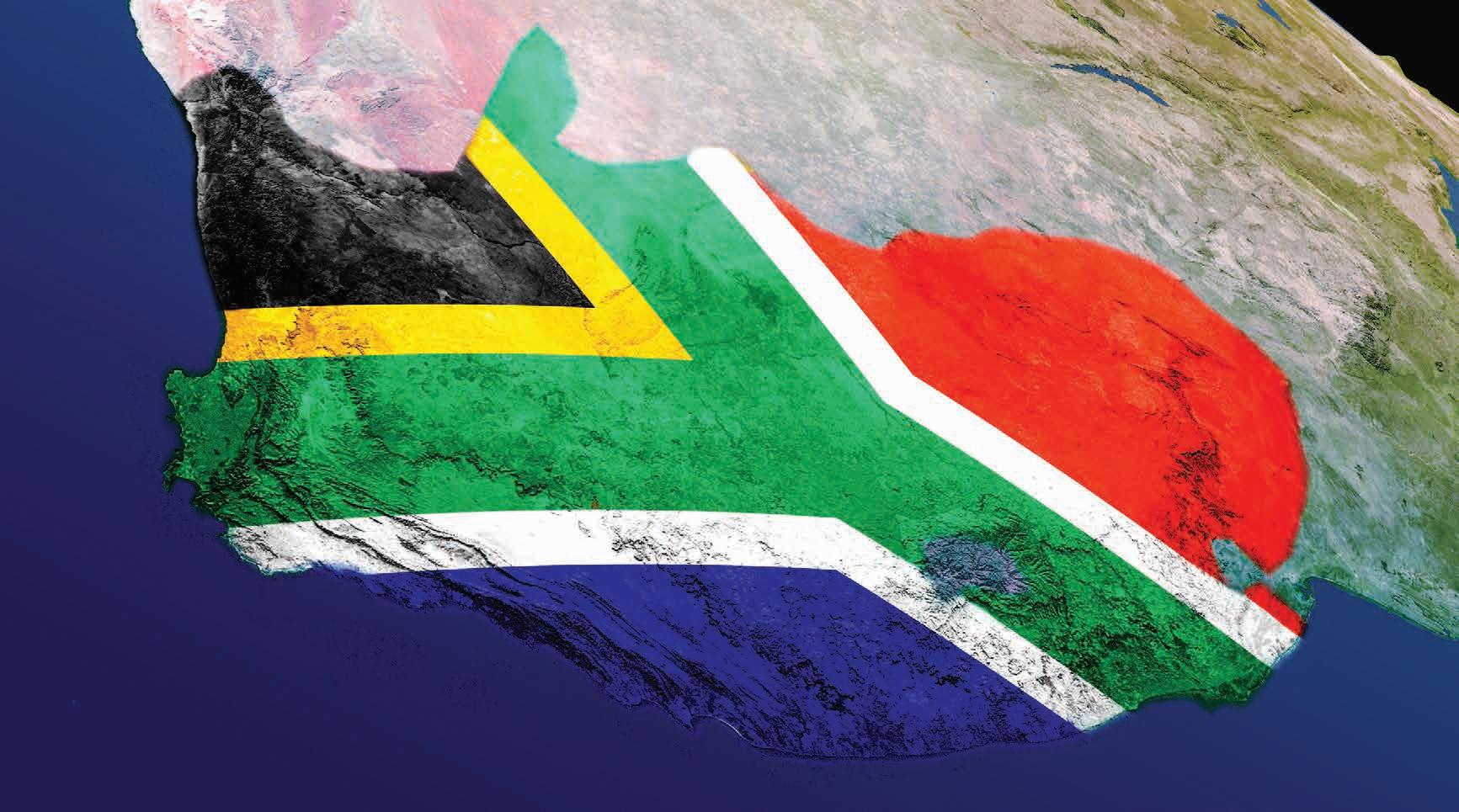
October
October
October
October
October
October
October
The section
notices are available on the MDB’s website

The
has also introduced an online objection form (non-compulsory) that can be used. The form is available on the MDB website.
Province Date of Publication Gazette Number Notice Number Closing Date for Objections
Cape 26 September 20224814387 26
2022 Free State 23 September 20225583 23
2022
Natal 29 September 20222454327 29
2022 Limpopo 30 September 20223330298 30
2022 Mpumalanga 30 September 20223444206 30
2022 North West 27 September 20228418373 27
2022 Northern Cape 26 September 20222544275 26
2022 Western Cape 22 September 20228660108 22 October 2022 municipal demarcation board
municipal outer boundary change/ re-determination process
underway,
redetermination proposals
21
www.demarcation.org.za
MDB
The section 21 notices were published in the respective provincial gazette as follows: Written objections must strictly be emailed to registry@demarcation.org.za, or faxed to 012 3422480, or posted to Private Bag X123, Centurion, 0046, or hand delivered to Eco Origins Office Park, Block C1, 349 Witch-Hazel Avenue, Highveld, 0157. For enquiries, contact the MDB on (+27)12 342 2481 The objections must be addressed for the attention of the Chairperson of the MDB. The Municipal Demarcation Board (MDB) calls for objections to municipal outer boundaries Scan the below QR code to go directly to the Demarcation Board website.
HOW CUTTING WATER LOSS CAN GROW MUNICIPAL REVENUE


CONSUMPTION
FRAUDULANT ACTS


Astudy into the loss of revenue through inadequate water meter reading and billing has shown how municipalities can stem the loss and collect additional income for service delivery.
With the cost of providing services rising and the scarcity of water looming in South Africa, the ndings of the study will be welcomed by all municipal o cials seeking solutions to these two pressing challenges.
The study was done by the Vuthela iLembe Local Economic Development (LED) programme – a joint initiative of the State Secretariat of Economic Affairs of the Swiss Confederation, the KwaZulu-Natal Department of Economic Development, Tourism and Environmental Affairs, and iLembe District Municipality, and the KwaDukuza and Mandeni Municipalities.
The Vuthela Programme is a ve-year comprehensive local economic development programme in the iLembe District to promote sustainable inclusive economic growth and job creation through initiatives to:
• improve municipal nances;





• improve municipal infrastructure planning and delivery;


• support private sector development through business environment reforms and SMME development;




• support sector initiatives promoting inclusive growth; and





• support partnerships and co-ordination.
The case study, as part of the Vuthela programme’s Municipal Infrastructure component, has demonstrated how the iLembe District Municipality (IDM) could improve revenue generation and curtail nonphysical water losses. This refers to municipal
supplies that are “lost” through nonpayment, and does not include



leaks or burst pipes.
South Africa is a water-scarce, developing and highly unequal society and municipalities cannot afford to waste water resources or incur unnecessary financial expenditure, according to a report on the study.
36 VOICE OF LOCAL GOVERNMENT ISSUE 40 This article is based on a study of the causes of technical and nontechnical water losses in KwaZulu-Natal municipalities and the concomitant loss of revenue.
water
water lost through
llegal Connections y nknown Consumers ILLEGAL
ERRORS naccurate Recording o Consumption naccurate Customer Account ata Metering aults Meter ampering nsa e Leads ata raud Corruption Re enue management alue chain llegal connections and the
KwaDukuza and Mandeni Local Municipalities
Non-Revenue Electricity Losses
Supply Side LOSSES Demand Side LOSSES Lack o puniti e action Bylaws yndicate acti ities ndigent tari No re enue protection section / udget Lack o specialisation
It was found that revenue for about 61 per cent of the water being supplied by these municipalities was not being collected. The world average for nonrevenue water is 36.6 per cent.
“South Africa is a water-scarce, developing and highly unequal society and municipalities cannot a ord to waste water resources or incur unnecessary nancial expenditure,” warned a report on the study.
The findings of this study are therefore applicable to all municipalities in South Africa that face similar challenges.
The LED programme aims to improve the economic future of residents in the iLembe District through sustainable economic growth of the local economy and the creation of more inclusive employment and income-generating opportunities.
The e cient management of water demand and supply is central to this aim, as water is essential for survival, health and safety, economic activities, social development, social equity, environmental protection and political stability.
PILOT AREA
Water metering and billing were assessed within a pilot area of Sundumbili near Mandeni. This area had exhibited high water losses within the IDM.
According to Statistics South Africa, the Sundumbili area has 10 858 households and 32 629 residents. This represents about 5.7 per cent of the total number of households (191 370) in the IDM.
This area was selected to conduct the pilot study to determine commercial losses as it was typical of many areas where meter reading inaccuracy, data transfer errors, and unauthorised connections had led to a loss in revenue.
The project focused on the process of meter reading, meter data management, transfer of the data to the billing system and the billing process. The study also evaluated
the actual billing and sales volumes against the volume of metered water supplied by the municipality.
The study found that Sundumbili was a formal area with good potential for metering, reading, billing, and cost recovery.
Most properties were metered, but meter maintenance, reading, billing, and cost recovery were deficient, resulting in excessive water use and loss of income.
About 25 000 prepaid meters were not read and only 50 per cent were operational. Prepaid meters were last read in June 2016. The municipality decided to discontinue the installation of prepaid meters and revert to conventional meters.
About 60 per cent of the water connections were considered illegal and often resulted in leakages.
The billed consumption was found to be 44 per cent higher than the actual metered consumption, suggesting that the metered consumption estimated for billing purposes was in ated and customers were not billed based on their actual consumption.
However, the average rate per kilolitre was in line with the average domestic rate of the municipality.
Analysis of the prepaid water purchases between January and March 2019 indicated the average user purchased R236 of water, which was about 13 kl/month.
It was noted that some users had spent more than R1 000 per month on prepaid water purchases.
Metering and billing have become critical political issues in the area. Consumers who do not pay are disconnected, but this was di cult to enforce.
The study found there was scope to promote political ownership, community engagement, and education to address issues around water saving and billing.
It emerged that there were over 3 000 stands in the area being supplied with water,
but these were not included in the IDM database. This area, known as Manda Farm, is an urban development that has yet to be formalised in terms of parcel registrations. The housing standards in this area indicate that users should be able to afford payment for water services, but they are not being billed due to the informal, unmetered connections.
KEY FINDING AND RECOMMENDATIONS
A detailed investigation of the meter reading process in other parts of the municipality revealed that the water meters were read manually and the recorded data was transferred to the electronic billing system. The transfer process was found to be accurate, with few errors.
However, an analysis of the meter reading dates revealed that the majority of meters had not been read in the past six months. In these cases, the municipality billed according to estimates. But estimates would not re ect the actual water used if household demographics changed due to improved facilities or occupant numbers.
Only 46 per cent of the meters in Sundumbili were last read in 2019, and the bulk of the Mandeni prepaid meters were last read in 2016.
This presents a potential loss of signi cant income to the municipality.
It was estimated that about R7-million in additional income could be generated monthly if all conventional meters were read and billed on a regular basis.
The study recommended that all consumers with individual water connections should be metered. Accounts should be opened for all consumers who have conventional and prepaid meters.
The IDM should consider alternative billing options for unmetered consumers, such as a at rate instead of block tari s.

There should be a routine analysis of water consumption to identify consumers with low- or high-consumption patterns, or where meters may have malfunctioned, to ensure the correct water volumes were recorded and billed.
WHO ARE THE PARTNERS?
Unauthorised connections and theft of water – where consumers deliberately tamper with their metered connection to reduce or eliminate ow or connect illegally to existing municipal water services – should be located with an advanced programme to detect unauthorised consumption. ›
37ISSUE 40 VOICE OF LOCAL GOVERNMENT COMMUNITY INTEREST THE LONG VIEW
The Vuthela iLembe LED Programme is a joint initiative of the State Secretariat of Economic A airs of the Swiss Confederation, the KwaZulu-Natal Department of Economic Development, Tourism and Environmental A airs, the iLembe District Municipality, and the KwaDukuza and Mandeni Local Municipalities. The programme includes the participation of the Ndwedwe and Maphumulo Local Municipalities.
Water Case Study
MAINTENANCE
Full implementation of the smart metering system was recommended to ensure up-to-date electronic data was available for billing.
It was suggested that an automatic meter reading telemetry system should be installed and maintained at reservoir sites to limit lengthy daily trips to monitor the status of the bulk distribution system and to ensure accurate reporting for drafting the monthly water balance.
This will enable more e ective planning as the volume of water available to the municipality at any given time will be known.
The municipality should allocate days for meter reading and meter repairs. Meter readers should be provided with the correct materials and tools to undertake meter maintenance. Meter readers have undergone training in performing basic plumbing, but refresher courses should be provided annually.
A proper metering strategy required that connections are metered, that all meters are properly installed and in working condition, and that the average meter error is within economic limits and in line with legislation.



It was recommended that domestic meters should be considered for replacement before they have been in use for 10 years, and bulk meters before ve years.
Water utilities should therefore replace 8–12 per cent of consumer meters every year to avoid possible meter replacement backlogs, resulting in the need to replace all meters at once. Consumer meters should be repaired, replaced, and maintained on an ongoing and regular basis. Regular meter testing should be undertaken to assess meter accuracy.
All meters should be read every one to four months, depending on budget and sta availability. Customers should be allowed to submit their own readings to limit interim estimates and promote awareness of their water consumption.
The nance department should perform a data integrity check to validate the correctness of data entered. The meter readings should inform actual billed consumption volumes.

The study concluded that ensuring improved metering, meter reading, record management, and analysis would lead to more accurate consumer billing and water balances. Accurate records will also ensure more accurate reporting and better planning.
HOLD

THE FIVE INTER-RELATED COMPONENTS OF THE PROGRAMME?

1. Public Finance Management: strengthening the nancial position of municipalities through better capacity to plan, nance, and manage infrastructure investments and the provision of public services.
2. Municipal Infrastructure: improved planning and access to infrastructure services for development investment, e ective and e cient service delivery, and sustainable growth.
3. Private Sector Development: greater investment in and growth of small and medium enterprises (SMEs) leading to increased employment.
4. Building Inclusive Growth: inclusive and sustainable growth and employment interventions to support SMEs in growth sectors.
5. Partnership and Co-ordination: sustained partnerships and capacity for local economic development in the iLembe District, and the replication of the approach in policy elsewhere in South Africa.
In the long term, it will improve the consumer’s trust in the water services provider and ensure the sustainability of water services.
The study also recommended that all prepaid meter devices that were installed onto conventional meters should be removed. This initiative should be accompanied by a communication strategy to inform consumers of the change and implications of being put on the municipal billing system so that they can receive accurate monthly water bills.
An upgrade of the information management system was also recommended. It was suggested that the asset register and prepaid meter information be consolidated to create a single database for meter reading, billing and revenue management.
The case study and its recommendations have been presented to the IDM’s senior management for implementation consideration. The case study and its methodology can be applied to any municipality keen to e ect water-saving and generate revenue more e ciently, thus addressing two of the most urgent obstacles to e cient service delivery and local economic development. ▪
38 VOICE OF LOCAL GOVERNMENT ISSUE 40 IMAGES: SUPPLIED COMMUNITY INTEREST THE LONG VIEW
KwaDukuza and Mandeni Local Municipalities
HOUSE-
ENGINEERING FINANCE METER BILLING SYSTEM BILLINGNO COST RECOVERED METER
METER READER AND READING • Cycled • Broken • No Access • No Meter • Reading Error • High / Low consumption



JOIN AN ELITE GROUP OF RISK MANAGEMENT PRACTITIONERS www.irmsa.org.za Register for the IRMSA CRM Prac Board Exams!
DEVELOPMENT PLANS TO STIMULATE THE LOCAL ECONOMY
The Chris Hani District Economic Development and Investment Summit has put the district in a prime position to drive the Eastern Cape’s economy.
By Trevor Crighton
In partnership with the Chris Hani Development Agency (CHDA), the Chris Hani District Economic Development and Investment Summit took place in July this year – and there are already tangible plans to help it meet its ambitious ve-year developmental goals.
The CHDA was established by the Chris Hani District Municipality with the sole focus of implementing catalytic projects intended to unlock the economic potential of the district.
The district’s “Vision 2030” seeks to contribute to an increase of 3–5 per cent economic growth and investment to improve the quality of life in the area.
SETTING THE SCENE
The summit aimed to capitalise on the district’s strengths, in line with six strategic pillars:
• forestry; • renewable energy; • livestock;
• irrigated crops; • agro-processing; and • tourism.
“Approximately R1.9-billion was pledged at the summit, excluding the public investment from mandated departments,” explains Chris Hani District Municipality executive mayor Wongama Gela. “We had many pledges from private investors, including one from Germany with a focus on renewable energy. Other potential investments focused on agro-processing and automotive came from national investors.”
In terms of economic infrastructure, Gela says there were important outcomes in integrated solutions and partnerships for transport, energy, land, and water infrastructure. On the agriculture and agro-processing pillar, there were pledges
toward the dairy cluster, beef and processing cluster, wool production and processing, timber production and processing, winery industry establishment, deciduous fruit investment, and rain agri-fund establishment, with clear investment value and partnerships from stakeholders.
More than R1-billion in renewable energy infrastructure was pledged toward the renewable energy, ICT and automotive pillar. An investment for the establishment of an automotive hub was pledged and a partnership was proposed with the African Centre for Renewable Energy Studies at Stellenbosch University.
TANGIBLE OUTCOMES
“Follow-ups with partners and investors have begun, and we’ve received commitment and an action plan from the renewable energy investors,” says Gela. “We held a roundtable seminar as part of the summit with the Centre for Renewable and Sustainable Energy Studies at the end of September in partnership with CDHA, and are currently involved in twinning negotiations with the Western Cape Head of Department for Agriculture and the Eastern Cape Head of Agriculture, and the wine industry”. The summit has resolved to
establish the Chris Hani Investment Advisory Committee to help facilitate the process.
Attendees also resolved to prioritise the grain and fodder production infrastructure to establish a fodder bank along the Great Fish River, as well as irrigation schemes. They agreed to focus on the fruit production corridor proposed for the Gubenxa Valley, Shiloh and other potential areas, with a phase one feasibility study in the Gubenxa Valley covering 1716ha to the tune of R635-million, excluding infrastructure requirements. A key development was the designation of the Komani Industrial Park as a hub and fresh produce production corridor in partnership with Farmwise, with an initial investment value of R120-million through the private and public sectors.
Usizo Engineering pledged R75-million toward renewable energy projects to provide Emalahleni Local Municipality with 10MW, Inxuba Yethemba Local Municipality with 20MW, and Enoch Mgijima Local Municipality with 30MW. R80-million was committed for an automotive hub, and plans are in progress for a forestry development of more than 10 000ha, working with the Eastern Cape Rural Development Agency. Feasibility studies for establishing cannabis and hemp plantations are underway, and farmers and co-ops supplying produce to the Chris Hani Fresh Produce Packhouse will receive support.
“As per the district’s ve-year strategic plan, some of the investment will be realised soon; others are in the preparation stage – including comprehensive feasibility studies, compliance and environmental impact assessments,” says Gela. “These will be categorised into short-, medium- and long-term plans. I am con dent that the partnerships and commitments made by the stakeholders will contribute to the economy both through employment and gross domestic product.”

40 VOICE OF LOCAL GOVERNMENT ISSUE 40
▪
“We had many pledges from private investors, including one from Germany with a focus on renewable energy. Other potential investments focused on agro-processing and automotive came from national investors.”
–
Wongama Gela
Wongama Gela
THE PLAYGROUND FOR LOCAL TV SHOWS
The ninth season continued to develop the local industry – not only in the lm production space, where regional skills have been sorely lacking – but also in the support functions required to house, feed and transport a near 200-strong crew and 20 castaways.
“Setting Survivor South Africa in the Eastern Cape for a second consecutive year allowed us to reconnect with service providers, crew and support functions we had worked with before. We could reap the bene ts of the training and upskilling they had previously received to help us deliver an even more incredible show this year,” says MultiChoice group executive: corporate a airs Collen Dlamini.
Dlamini says production of the most recent season boosted the Eastern Cape economy to the tune of over R18-million in the space of just three months. “We created 65 jobs through this production, with 68 per cent of those being within the youth demographic. MultiChoice also generated donations of over R400 000 for the Amagqunukhwebe Prudhoe Community Development Trust and Tatshana Junior and Senior Primary School in the area where production took place,” he says.
NURTURING TALENT

Season 8 and 9 of Survivor South Africa were shot in the Eastern Cape, showcasing the province’s abundant beauty, contributing to upskilling local people and providing a welcome post-COVID-19 economic injection.

LOCAL REWARDS
Season 8 – Survivor South Africa: Immunity Island – was lmed in Ngqushwa Local Municipality near the Fish River Sun Resort at the end of 2020, with the Amathole District Municipality having identi ed lm and television production as one of its key economic growth and development initiatives.

The ninth season was lmed on the “Sunshine Coast” to the south, providing a similarly challenging backdrop for the returning castaways of Survivor South Africa: Return of the Outcasts to compete for the South African version’s biggest-ever purse: R2-million. Both seasons were produced


in partnership with the Eastern Cape Development Corporation (ECDC).

Season 8’s production – the rst-ever version of Survivor South Africa to be lmed on local soil – saw producers Afrokaans employ 103 local people across all departments of the show, boosting the local Wild Coast economy by over R10-million. “During production, we employed local people as carpenters, set builders, production assistants, camera and grips assistants, lifeguards and security personnel, as well as painters, drivers, and art department assistants,” says creative producer and series director Leroux Botha.
“Besides the skills transferred by the di erent departments to people who had never worked on a TV production set before, the in ux of capital into the area made a big di erence in the lives of the local people. In addition, a lot of the building material for the di erent challenges was donated to local schools and communities.”
“The region’s potential for business development, tourism, agriculture and lm production has not been fully exploited,” Amathole District Municipality executive mayor Nceba Ndikinda said at the launch event for Season 9. “This initiative will boost the region’s economy and contribute to cultural renewal.”
business
Mlungisi Mvoko, Eastern Cape Department of Economic Development, Environment A airs and Tourism MEC, said that the income generated was used to fund the Eastern Cape Investment Fund, which has been vital in developing the lm industry.

“The ECDC investment attracted R268-million investment, resulting in 6 587 temporary jobs, and bene tting 454 small, medium and micro enterprises during the production of both seasons of Survivor South Africa and another local series.
The variety of skills transferred to communities and the use of local talent will assist in strengthening the lm industry. The ECDC has committed nancial resources to support the establishment of a lm studio at Fish River Sun, which will radically transform the industry in the region. ▪

41ISSUE 40 VOICE OF LOCAL GOVERNMENT MUNICIPAL MATTERS THE LONG VIEW
The Eastern Cape is attracting global lm and media attention after hosting the last two seasons of Survivor South Africa, reports Trevor Crighton
Survivor South Africa Season 9 crew on location.
Collen Dlamini
IMAGES: SUPPLIED
SAFETY FIRST
In March this year, Stellenbosch Municipality executive mayor Gesie van Deventer unveiled a new state-of-the-art municipal control room in Stellenbosch that marked an important step toward achieving the municipality’s goal of becoming the safest municipality in the country by 2025.

The facility will act as a centralised base from which e orts to combat crime and respond to incidents will be managed. The control room will also house all partners of the Stellenbosch Safety Initiative (SSI), a collaborative umbrella organisation that brings together various private and public safety partners operating across the area, which has a population of 192 879 people (2020, excluding the student population) and covers an area of roughly 900 km²
THE POWER OF PARTNERSHIP
“This amazing collaboration of all security agencies now has the entire municipality under safety surveillance – from Raithby to Klapmuts, Kayamandi to Franschhoek, Pniel to Cloetesville, and Ida’s Valley to Jamestown,” says executive mayor Gesie van Deventer. “The SSI is a rst in our country and since its establishment, many municipalities have adopted this model to form their own public-private safety partnerships. The SSI currently includes municipal law enforcement, tra c services, disaster management, the South African Police Services (SAPS), community policing forums, neighbourhood watches, campus security and various private security companies.” She says that the aim of the facility is to help ensure the
effective sharing of intelligence, efficient co-ordination of responses and allow for faster reaction times when responding to crime-related incidents in communities.
The control room has live feeds to numerous CCTV cameras and 67 licence plate recognition (LPR) cameras, placed at various sites across the entire municipal area, with the aim to increase numbers over the next few months and years. The SSI control room is also home to a specialised war room with state-of-the-art information and communication technology equipment that will help the stakeholders better facilitate responses during times of crisis.
Currently, 12 control room operators are employed at the facility, working in shifts of
42 VOICE OF LOCAL GOVERNMENT ISSUE 40
Stellenbosch Municipality is determined to become the safest municipality in the country by 2025, writes Trevor Crighton
Gesie van Deventer
three persons at a time to ensure 24-hour coverage, 7 days a week. The control room will also act as a central location to monitor alarms at all Stellenbosch municipal properties, o er real-time tracking of municipal vehicles, and house the after-hours switchboard and municipal 24-hour WhatsApp line. “We rely on drone technology, CCTV screens, two-way radios, a 24-hour emergency call centre, 24-hour agents on duty, and a dedicated WhatsApp line to help manage and communicate problems – the main aim is to share intelligence and information as quickly as possible for a co-ordinated and fast response to any incident that is reported,” says Stuart Grobbelaar, manager: communications in the o ce of the municipal manager. “We are also working on plans to roll out other arti cial intelligence (AI) cameras, which will perform speci c functions. Taking all of that into account, coupled with our Stellenbosch Safety Forum, which will create workstreams to address causes of crime and continued partnership building, we aim to be the safest town in SA by 2025.”
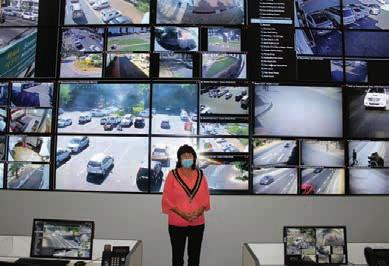
SALGA senior advisor: inclusive communities Trevor Lombard welcomed the introduction of the Stellenbosch Municipality SSI control room, which is in line with SALGA’s focus on supporting municipalities to perform the community safety function.
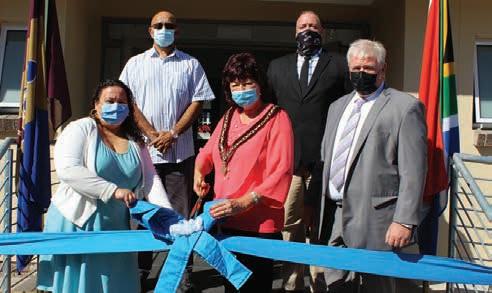
FIRST RESPONDERS
Grobbelaar explains that the unique SSP (Stellenbosch Safety Partnership) comprises
all the major safety role players: SAPS, municipal protection services, campus security, private security companies and 45 neighbourhood watches. “In terms of our Memorandum of Understanding, each of these partners are in contact via one radio network and WhatsApp groups. In case of an emergency or incident, the partner closest to the incident will respond as a first


responder. Each of these partners can also deploy a presence to our control room to assist existing sta in monitoring our more than 320 cameras all over Stellenbosch,” he says.
“This beautiful control room will serve residents of our municipality for generations to come and will ensure safer streets and safer communities for all,” says van Deventer. ▪
The aim of the facility is to help ensure the effective sharing of intelligence, efficient co-ordination of responses and allow for faster reaction times when responding to crime-related incidents in communities.
43ISSUE 40 VOICE OF LOCAL GOVERNMENT MUNICIPAL MATTERS
THE LONG VIEW
Stellenbosch Municipality Executive Mayor Gesie van Deventer experiencing how suspicious activity can be monitored in the new municipal control room.
Executive Mayor van Deventer in the heart of the municipal control room.
Stellenbosch Municipality Executive Mayor Gesie van Deventer unveils a new state-of-the-art municipal control room in Stellenbosch.
IMAGES: SUPPLIED

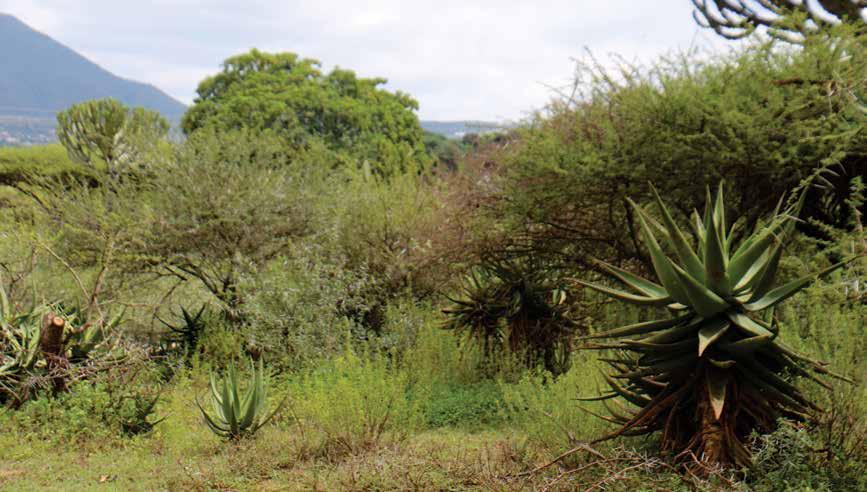



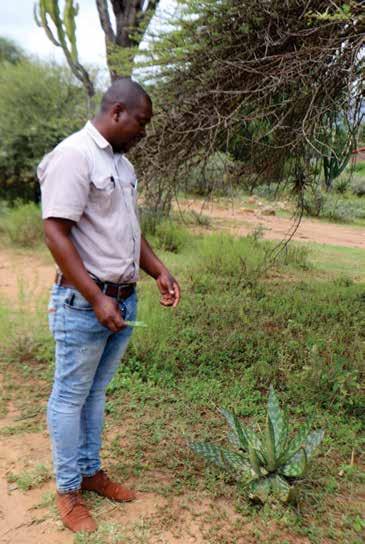


ADOPT A MUNICIPALITY
SALGA Gauteng’s “Adopt a Municipality” programme has seen it shepherding Emfuleni, Merafong and RandWest City to augment the outputs of its Municipal Audit Support Programme.
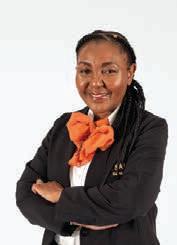
Maphefo Mgadi, senior advisor: nancial resilience at SALGA Gauteng, explains that the programme was conceptualised to augment the support SALGA already provides to municipalities. “The Municipal Audit Support Programme (MASP) was launched in 2014, however, during implementation, we noted that there were gaps in the support we were able to provide, which meant that the results weren’t as positive as they could have been,” she says. “The ‘Adopt a Municipality’ programme doesn’t replace MASP, but acts as a tool to enhance the work we are currently undertaking. We looked at the scope, requested municipalities to indicate the areas where they were lacking, despite support from the Department of Cooperative Governance and Traditional A airs (CoGTA) and the Gauteng Provincial Treasury, and looked at how we could help.”
STARING DOWN CHALLENGES
Challenges faced by SALGA include the use of the Auditor-General’s ndings as a baseline to craft a support plan for municipalities with, in most cases, a lack of buy-in. The Auditor-General’s ndings are around nancial management-related matters and other challenges, such as municipal protests, infrastructure, and issues, which are not expressed fully, meaning that the current support structure is hamstrung by the nancial wellbeing of municipalities. The duplication of resources between SALGA,
CoGTA, and the provincial treasury in supporting municipalities in the province also presents a challenge. There are no monitoring mechanisms to gauge the value of support provided by SALGA and no provision of assessments or feedback on the work that SALGA has undertaken in municipalities. The support is given on an ad-hoc basis, with no formal agreements in place with municipalities. Mgadi says that SALGA Gauteng eventually consulted with the three municipalities around their needs, while also looking at how it could augment national and provincial capacity and add value.
SALGA Gauteng believes that it is pointless for a municipality to have consecutive clean audits while its residents don’t have water or food.
HELP WHERE NEEDED
The three municipalities forming part of the initial programme were chosen for various reasons.
Emfuleni was selected because two financial years ago, it received a qualified audit, but improved in terms of 2020/21’s audit outcomes – though it could clearly do with more support.
SALGA




Philisiwe Tau, provincial director of operations at SALGA Gauteng, says SALGA was forced to consider its advisory and support function when many of the municipalities it works with didn’t receive clean audits. “We decided that perhaps we weren’t focusing on the right things – and we also couldn’t impose our will on municipalities – so we requested to look at audit outcomes from the AuditorGeneral to see what landed certain municipalities in hot water,” she says.
“There’s always a debate in local government about whether the focus should be on getting a clean audit or on spending budgets on service delivery. Sometimes when a municipality identi es a need and spends money, originally allocated elsewhere, to solve the problem, the Auditor-General ags the expenditure, and it looks to the public as if something is wrong.”
Merafong had received unquali ed audits in previous nancial years, but regressed. In the last nancial year, it received adverse audit ndings due to issues of capacity – most employees were acting in their positions, which negatively a ected governance and sound nancial management criteria. “Merafong is one of the municipalities we committed to assisting to get back to unquali ed audit status and become sustainable once more,” says Tau.
RandWest had experienced recurring adverse audit findings, but presented a particular challenge because its demarcation was altered in the last local government election to merge Randfontein and Westonaria. It inherited more capacity, but no plan to address challenges. The merging of the two financial systems affected the overall performance, resulting in employee costs exceeding programme costs and service delivery compromised.
The programme is included in SALGA’s Annual Performance Plan, which is a national measure, so each provincial division has now been asked to identify municipalities struggling with adverse audit opinions and work to assist them. ▪

46 VOICE OF LOCAL GOVERNMENT ISSUE 40 MUNICIPAL MATTERS THE LONG VIEW
SALGA Gauteng is taking troubled municipalities under its wing to help transform local government.
By Trevor Crighton
IMAGES: SUPPLIED
Philisiwe Tau
STRENGTHENING WATER AND SANITATION SERVICES
Municipalities will bene t from the Water Services Collaborative Programme, writes Trevor Crighton

SALGA has formed strategic collaborations with relevant sector stakeholders to strengthen the water and sanitation services of municipalities, and ensure that municipalities are equipped with the knowledge, resources and information required to meet this service delivery obligation – the Water Services Collaborative Programme.
There are 8 metropolitan, 44 district, and 226 local municipalities in South Africa. According to SALGA research, the water and sanitation operations of only eight districts and metros are rated as “functional”.
“Data is gathered from di erent sources such as Audited Municipal Annual Financial Statements, National Treasury, Department of Water and Sanitation, Stats SA and the Department of Cooperative Governance and Traditional A airs,” says Lubabalo Luyaba, specialist: Water and Sanitation at SALGA. “Each of these organisations has a speci c mandate as it relates to local government and therefore collects di erent data sets. For credibility, we use as far as practically possible municipal data that has been quality assured by an organisation independent of the municipality. However, this is not always possible as public infrastructure data and information management are not in a desirable state in South Africa,” he says.
FUTURE FOCUS
The 2022/23 focus of the Water Services Collaborative programme includes:

• Advocating for improved e ciency and functionality among water services authorities, underpinned by evidence-based decision-making through the use of data and information.
• Collaboration in the establishment of the Municipal Infrastructure Management E ciency Index.
• Supporting municipalities in the development of appropriate water and sanitation tari s through existing tools to support and enable e ciency improvement.
• Supporting municipalities in implementing the Municipal Infrastructure Grant reforms to assist them in building new infrastructure, while looking after existing infrastructure and supporting municipalities in improving their Green and Blue Drop scores through various strategies and plans.
Luyaba says that di erent municipalities face di erent challenges, so it is not possible to say that one municipality is “the worst”, as municipal challenges all result in communities not having access to water and sanitation. “A helpful way of looking at the problem is that
rural municipalities have a common set of challenges, as do small-town municipalities, secondary cities, and metros. Because access to water is a constitutional right in South Africa, any municipality with such people/ communities is not in an ideal state and must be assisted to ensure the realisation of this fundamental right,” he says. “The goal is to ensure all have access, whether in the most rural parts of our country or decaying mining towns or informal settlements on the outskirts of thriving cities … we are all equal and must be served with equal urgency.”
WATER AT WORK
At the core of SALGA’s mandate is capacity building, support, and advice to municipalities, so the organisation is always looking at how best to add value in this regard. “Many communities face the challenge of sustainable and reliable water and sanitation supply. In the municipalities responsible for this function, various issues are within the municipality’s control, including skills, operations and maintenance. Others, such as budget availability to meet the demand for new and existing infrastructure, are outside the municipality’s control,” says Luyaba. “We therefore provide a di erentiated support model that responds to the speci c issues in a particular municipality versus a one-size- ts-all approach.” He says that SALGA is drawing on expertise from municipalities, the private sector, academia, provincial government, national government and the organisation. “It’s all hands on deck in co-creating our shared water future.”
SHARED RESPONSIBILITY
Luyaba says no one entity is responsible for the country’s current water and sanitation issues. “We need to hold everyone in the system accountable for the undesirable performance of municipalities. There is a tendency to xate on just municipalities as though local government does not exist in an ecosystem that can either enable or cripple it. We need to recognise our shared and di erentiated roles and responsibilities in service provision and have accountability on the basis of those,” he says. “It cannot be that the only things not working in South Africa are municipalities. What role is the community playing? How e ective is the support being provided by provincial and national government? How well is the private sector playing its role, especially when providing professional services? These are things we must ask ourselves if we are serious about improving and sustaining local service delivery.” ▪
47ISSUE 40 VOICE OF LOCAL GOVERNMENT MUNICIPAL MATTERS THE LONG VIEW
IMAGES: SUPPLIED
Lubabalo Luyaba
Improve Service Delivery with Boxfusion’s SmartCitizen Solution


Efficient Service Delivery Makes For Happier Citizens
Boxfusion’s SmartCitizen is an end-to-end digital solution that streamlines engagement between government and citizens, using internet-connected smartphones running the SmartCitizen app.

Citizens can download Boxfusion’s Smart Citizen app and use it to communicate directly with their local government representatives. Through the app, issues affecting communities can be flagged. Things like potholes, fallen trees, burst water pipes, fires, and other civic issues that are the municipality’s responsibility to resolve, can all be reported via the app.
Better service through SmartService
Reported issues go into the solution’s SmartService component, which is a multi-channel contact centre solution for municipalities to use to manage the process from there. Through SmartService, logged requests are passed on to the right people within the municipality, and the job created.
Then, relevant workers are allocated and jobs scheduled in the solution’s SmartFieldwork component, which also monitors all progress towards resolution. The person who logged the issue is kept updated with all developments via push notifications delivered through the app or by SMS.
This way, municipalities are held to account by citizens, and citizens get to see municipalities delivering on promised services.
Scan me!
Smart Insights
SmartInsights is a reporting tool inside SmartCitizen for senior officials and managers, which gives them access to all of the data generated by the platform. At their fingertips is everything to do with service delivery, including all open jobs, all completed jobs, and all of the communication between themselves and their constituents.
SmartInsights offers officials the opportunity to track the efficiency of their resolution processes and identify trends and generate insights that can help them improve their planning and delivery over time.
Other Functions
Through the app, citizens also have access to details about their local representatives, a way to rate services received, lodge complaints, and even to view and pay utility bills.
By facilitating the conversation, Boxfusion gives citizens the transparency they need to know that government is working hard on their behalf.
Accountability, Transparency, Efficiency
Ultimately, Boxfusion’s SmartCitizen solution creates the kind of accountability, transparency, and efficiency that helps government departments to deliver on their promises.
Best of all, SmartCitizen is developed by a local software company that understands the South African landscape. It’s fast to deploy, and integrates with existing case management systems for a smooth rollout.
Speak to Boxfusion today about rolling out SmartCitizen to your department.
For more information or to request a demo, please contact us.
Mpho Hlalele | mphoh@boxfusion.co.za | +27 66 227 5801 Lethabo Makgato | lethabom@boxfusion.co.za | +27 71 415 5213
ILEMBE BENEFICIARIES FINALLY RECEIVE TITLE DEEDS
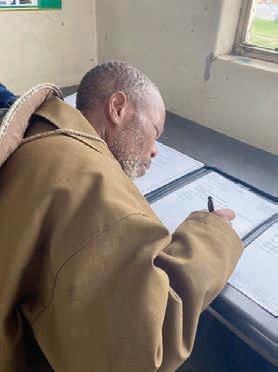
A pilot programme implemented by the International Finance Corporation in collaboration with the Vuthela iLembe Local Economic Development Programme is exploring opportunities to reduce the cost burden on homeowners trying to obtain their title deeds
The pilot programme looked at the possibility of securing the services of conveyancers for free in exchange for B-BBEE points. The first two beneficiaries to have benefitted from this arrangement have signed and received their title deeds after HSG Attorneys Incorporated handled the case file without fees and in terms of the applicable B-BBEE socioeconomic spend.
Under the Private Sector Component of the Vuthela project, KwaDukuza and Mandeni Municipalities have been working closely with the International Finance Corporation (IFC), a member of the World Bank Group, to make it easier to do business in the district, thereby attracting investment and creating growth and jobs. The work has primarily focused on the KwaDukuza Municipality, including making it easier to get electricity and implementing reforms in the municipal planning department – important given the property sector growth in the municipality. The third leg of the IFC’s “doing business” work is focused on property registration and is being implemented in both KwaDukuza and Mandeni by GeoAfrika, which has been contracted by the Vuthela programme.
“South Africa has a property registration system that is reliable, but it is not used by many South Africans because it is an expensive and complex system that is beyond the reach of the average citizen,” says senior operations officer at the IFC Amina El Zayat. It is estimated that 70 per cent of the population does not use the official system, and that most of the lower-value real estate market activity is conducted informally. This limits the security of tenure of homeowners. One of the focus areas of the project looked at a simpler and more affordable system for registering transactions for low-income areas.
More than 300 case files were collated from an office set up to assist Sundumbili residents with getting their title deeds, which they didn’t have because of the loss of the documents, intestate estates, divorce, and informal sales, or never having received the deeds when they took ownership of the house. The majority of these are being dealt with by the Title Deed Adjudication Committee, which has been established and funded by the province and supported by the project.
Considering that the cost of conveyancing could be an inhibiting factor for low-income households, the project team decided to test if they could get pro bono conveyancing work on two cases in exchange for B-BBEE spend points. The ultimate test was to validate whether the conveyancing fees and the disbursement costs, paid by the conveyancing rm during the transfer process, could be claimed against their B-BBEE social development spend target.
“This is exciting because it opens the door for a potential funding stream for qualifying bene ciaries from a large and previously untapped source – corporate B-BBEE spend. This could potentially attract large law rms to provide pro bono conveyancing services to further improve their B-BBEE credentials, making that service more accessible to the bene ciaries who generally couldn’t a ord this service,” says El Zayat.
The project team was very happy to hand over the title deeds to the two beneficiaries at no cost to them.▪

49ISSUE 40 VOICE OF LOCAL GOVERNMENT MUNICIPAL MATTERS THE LONG VIEW
IMAGES: SUPPLIED
One of the focus areas of the project looked at a simpler and more affordable system for registering transactions for low-income areas.
Sifunda Amos Nkosi from Sundumbili B signs his title deeds.
MUNICIPAL COUNCIL SPEAKERS GATHER
As municipalities delve deeper into their long-term goals and planned projects to help their cities grow and thrive over the ve-year term of o ce for current councils, municipal council speakers countrywide gathered for the SALGA Council of Speakers. By Bonolo Selebano
The SALGA Council of Speakers (SCoS) was held at the Matjhabeng Local Municipality in Welkom, Free State on 14 and 15 July 2022. The hybrid model gathering o ered keynote speakers and platforms for sharing best practices and lessons learned since councils were elected to o ce following the 2021 local government elections. It raised dialogue that will help local government drive the country’s long-term recovery and growth post-COVID-19. The SCoS was also attended by ministers, mayors and councillors.
The gathering kicked o with a welcome and opening address by Thanduxolo Khalipha, executive mayor of Matjhabeng Local Municipality. He informed delegates about the strides the municipality had taken on crucial municipal issues, such as service
delivery for local communities and capacity building within the municipality.
“When we took over, we had only one engineer. Since we have been in o ce, we have appointed more than thirteen engineers. For the rst time, we will be writing our own nancial statement, and we are happy to report that we have appointed more than fourteen accountants and over ten chartered accountants who have already started working on our nancial statement,” Khalipha said. “And, come the end of this month, we will appoint more than 160 security o cers who will be working toward strengthening our security department.”
He added that all these achievements were geared towards positioning the municipality to drive much-needed change in the lives of its residents and communities.
SALGA president Bheke Sto le said the gathering of local government leaders should not be just another talk shop, but a platform for putting words into action and improving local government in a tangible way.
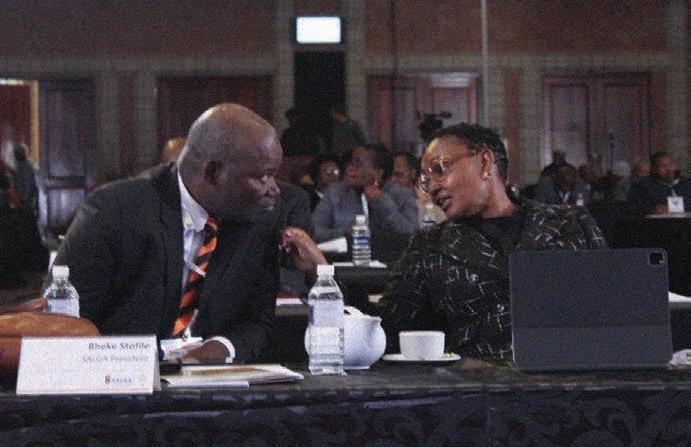
“We hope that this will lay the foundation for municipalities, under our steward leadership, to work together with local communities to nd sustainable ways to meet their needs and improve the quality of their lives,” he said.
Sto le added that a hands-on-deck e ort would be needed from the country’s municipal workforce at all levels for local government to deliver on its mandate.
“Let us use this opportunity for new thinking on how to enhance local democracy by bringing local government closer to the people.”
50 VOICE OF LOCAL GOVERNMENT ISSUE 40
KEYNOTE ADDRESS
Cooperative Governance and Traditional A airs (CoGTA) deputy minister Thembi Nkadimeng delivered the keynote address, providing a detailed analysis of the existing challenges and opportunities facing municipalities in the Free State province, and the changes needed. “Some key issues requiring urgent intervention in the province include political instability impacting the e ective functioning of administration; court cases by business organisations due to poor service delivery; the lack of skills and capacity to provide legal support to municipalities on litigation cases; nonfunctional wastewater treatment works and sanitation systems; and the need to eradicate the bucket system in some municipalities,” she said.
Nkadimeng also urged delegates to act on the growing challenges faced by local government and said that local communities must be included in the decision-making processes to achieve the much-needed change.
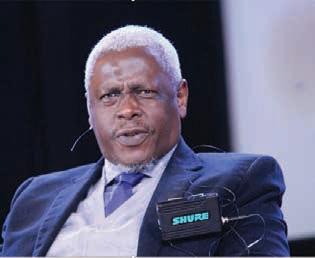
“The 2021 local municipal elections saw a new chapter for local government and demonstrated our democracy’s maturity and durability. The election of new councils a ords us an opportunity to get the basics right and improve the delivery of integrated services as obligated by the Constitution.”
PANEL DEBATE HIGHLIGHTS
The SCoS also featured numerous panel debates focused on the challenges and opportunities facing local government today.
Progress made by municipalities post the local government elections.

Re ecting on the transition to the fth term of local government, Mxolisi Dukwana, CoGTA MEC for the Free State, shared his views on the establishment of ward committees to enhance participatory democracy in local government. He argued that the establishment of such structures in local government should not just be a matter of “compliance”, but a commitment to giving local communities more say on issues a ecting them.
“The establishment of ward committees in the province has been going quite well with some glitches here and there, but the problem is that we are just complying. The law expects us to establish ward committees, we do that, but we do not appreciate the role of these ward committees in helping us realise the bill of rights,” Dukwana said.
Speaker of Modimolle-Mookgophong Local Municipality Sinah Langa outlined the processes that led to the establishment of ward committees following the 2021 municipal elections.
She explained that the nomination of members to serve on these committees was done by a show of hands, and that the process was agreed to by community members and stakeholders.
She added that the Independent Electoral Commission (IEC) was present to preside over the nomination and election processes to ensure their credibility and legitimacy.

Speaker of eThekwini Metro Thabane Nyawose re ected on the lessons learned in the formation of coalition governments. He said humility and cementing good relations with all political parties in council were fundamental to the success of coalition arrangements at the local level.
“We’ve learned lessons through working with coalitions. One is humility. If you’ve been in government for some time, favoured by numbers, you tend to be arrogant,” Nyawose explained. “But once you’re in a coalition, you are forced to read and empower yourself with information.” Raymond Dhlamini, speaker of Ekurhuleni Metropolitan Municipality, said the challenges confronting coalition rule at local government level were well documented and that political parties needed to adopt a sense of urgency and unity in bringing about positive change in the lives of residents and communities.
“We know the issues a ecting our communities, but are we ready to unite among ourselves and start providing services to the people? In some cases, it’s not about having an insu cient budget, it’s just about not wanting to listen to communities – that is not right. Let us promote public participation, not just sit in our o ces and have co ee,” he said.
51ISSUE 40 VOICE OF LOCAL GOVERNMENT THE BULLETIN SALGA IN ACTION
SALGA deputy president Flora Maboa-Boltman addresses delegates at the SCoS.
MEC for CoGTA, Free State Mxolisi Dukwana in a panel discussion on the transitional progress following the 2021 municipal elections.
“The 2021 local municipal elections saw a new chapter for local government and demonstrated our democracy’s maturity and durability.” – Thembi Nkadimeng
Managing council business through the application of standing rules and orders of council.
Nkadimeng and Donovan Joubert, speaker of the Cape Winelands District Municipality, spoke about the importance of standing rules and orders of council for the overall management of proceedings in local councils.
Both speakers emphasised that these standing rules and orders enabled local authorities to discharge their decision-making responsibilities in a transparent, inclusive, and legal manner, which inspired public con dence.
“I’ve also learned the importance of establishing relationships. If council members relate to each other on a brotherly and sisterly level, they will be able to manage councils or the task at hand much better,” said Nkadimeng.
Joubert also outlined how standing rules and orders of council in uenced the conduct of various proceedings, including meetings in the municipality he represents.
He added that such processes enhanced local democracy and fostered collaborative workings in councils.
Joint panel debate on managing coalition governments to enhance municipal governance and service delivery and the role of speakers in section 139 and 106 interventions. This debate was facilitated by SALGA deputy president Xanthea Limberg who shared her remarks on how coalition municipal governments were becoming an increasingly signi cant feature of contemporary South African politics.
“Coalitions are undoubtedly becoming a more common feature in the makeup of


councils, and as we recognise the possible threats and risks of coalition governments and the political and government instability that often follows coalition governments, it does also require more e ort to identify the possibilities and opportunities to strengthen and stabilise coalition governed municipalities.”
SALGA chief operations o cer (COO) Lance Joel briefed delegates on the organisation’s Coalition Government Framework, which provides practical guidelines to political parties and councillors on the formation and management of coalitions in local government.
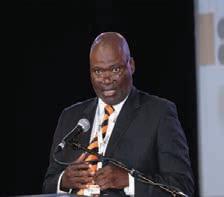
He also spoke about the conditions that gave rise to the drafting of the framework.
“We picked up in the 2016–2021 term of o ce that coalition governments came with plenty of instability, which adversely impacted communities. Councils are seized with motions of no con dence, and are exclusively focused on that instead of on the execution of the promises made to the electorate –this was of serious concern to SALGA,” Joel said.
Mangaung council speaker Stefani Lockman-Naidoo spoke about how political instability in the metro exacerbated the challenges arising from the metro having being under provincial administration since 2019.
“I had to call four budget meetings to get the budget approved. Some political parties want speci c things that just can’t be achieved. Our budget was approved, it is funded, but unsustainable.
“We have no reserves. In the seven months I have been in o ce, I’ve had four acting city managers – two have been taken to court, and the others have been removed.”
Johannesburg council speaker Vasco da Gama spoke about critical appointments within the city. Some of these will include a city manager and an acting secretary of the council.
“The coalition government consists of none political parties. We have regular meetings to discuss the state of the city and what we should be concentrating on to ensure that the necessary service delivery is given to residents,” he said.
The role of speakers to protect the checks and balances between the legislature and the executive.
“We can do more in engaging with communities, increasing their participation in local government. This will allow them to take ownership of local government business. In our view, communities are shareholders of our business,” he said.
Councillor support models, systems, and remuneration.
Nkadimeng, Satish Roopa, commissioner on the Independent Commission for the Remuneration of Public O ce Bearers, and SALGA NEC member Samkelo Janda spoke about the wellbeing of councillors from a safety and security, remuneration and skills development perspective.
capacity-building opportunities;
payments of benefits to
The general thought from the panellists was that more action was needed to protect councillors from threats, abuse, and intimidation; increase training and capacity-building opportunities; and ensure the timeous payments of benefits to nonreturning councillors after municipal elections.
CLOSING ADDRESS
Closing the second and nal day of SCoS, SALGA’s Sto le said councillors and delegates should return to their respective municipalities more eager to in uence positive change in their communities, and should recognise how important their role is in improving local government.
“Let’s seek to empower communities everywhere we live and work, we cannot live without communities, we expect them to pay their rates and taxes so we must serve them diligently.” ▪

52 VOICE OF LOCAL GOVERNMENT ISSUE 40 THE BULLETIN SALGA IN ACTION
Bheke Stofile
Delegates at the SCoS absorb insights from the panel discussions.
IMAGES: SUPPLIED
Over
A
Years of dedication to Local Industry!
opportunities, enables skills development
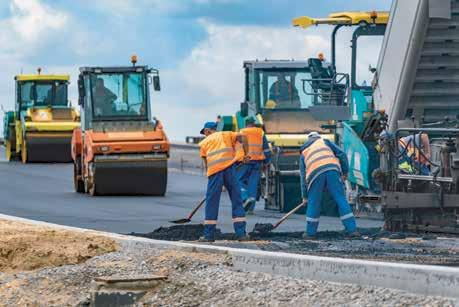
step is procuring locally manufactured goods,


SABS’ mandate is to
conformity assessment, and local content
country's industrial, economic, and developmental
us!
Municipality for SANS 18091:2020 Quality Management Systems (QMS)
Certify
SANS/ISO 18091 is
system
essential
(i.e. effectiveness of


to
that
the
of
9001 in local government
at all levels (i.e. strategical,
of
have a
of
Municipalities through Quality Management.
SABS a Trusted Partner in Delivering Quality Assurance. Contact SABS to establish support for your Standardisation, Testing, Local Content Verification, Training and Certification Aspirations. SABS_SALGA_10/2022 SABS provides services to assist the implementation of best practice solutions • Manage and develop South African National Standards • Laboratory Testing Services for a diverse range of Products. Supporting of Municipal delivery through: Testing of water quality, Testing/Certifying Water Meters, Smart Meters, and other products/systems • Certification of Companies to Management System Standards • Certification of Products and the Application of the SABS Mark Scheme • Training of Management and Employees on Implementations of SANS • Local Content Verification for South African manufacturing industry
75
thriving manufacturing industry creates jobs and business
and improves our competitiveness in global markets. A first
this has obvious benefits for national competitiveness and economic growth.
provide standardisation, voluntary
verification services to enable the achievement of the
objectives. Start your Certification journey today and Contact
FIND INFO LCV ONLINE
your
Guidelines for
application
ISO
applicable
all local government processes
tactical-managerial and operational) in order to constitute a comprehensive quality management system that focuses on the local government achieving its objectives. The comprehensive character
this
is
to ensure
all the areas of the local government
specified level
reliability
the processes). Improve Delivery to
GET STANDARD ONLINE
